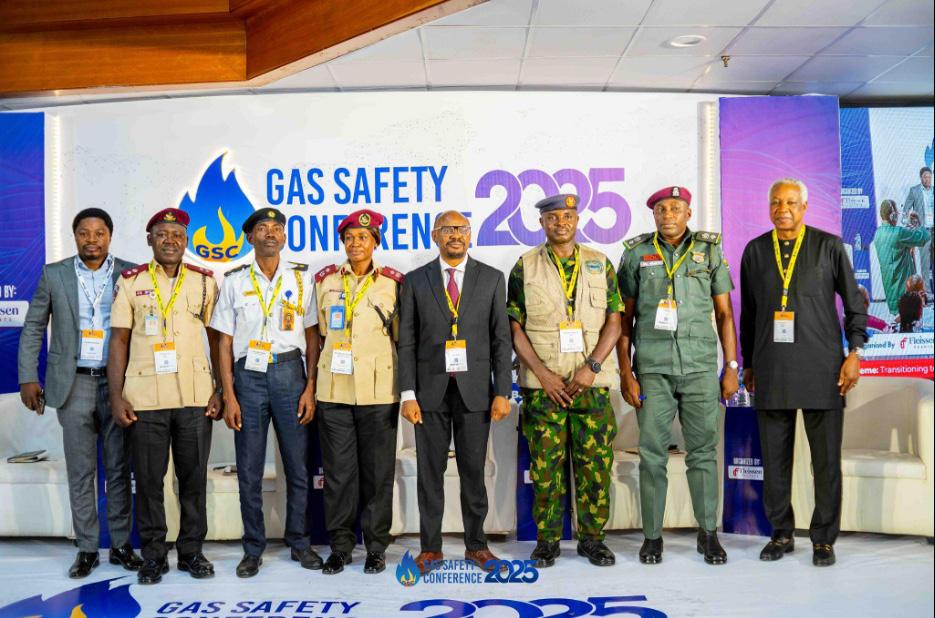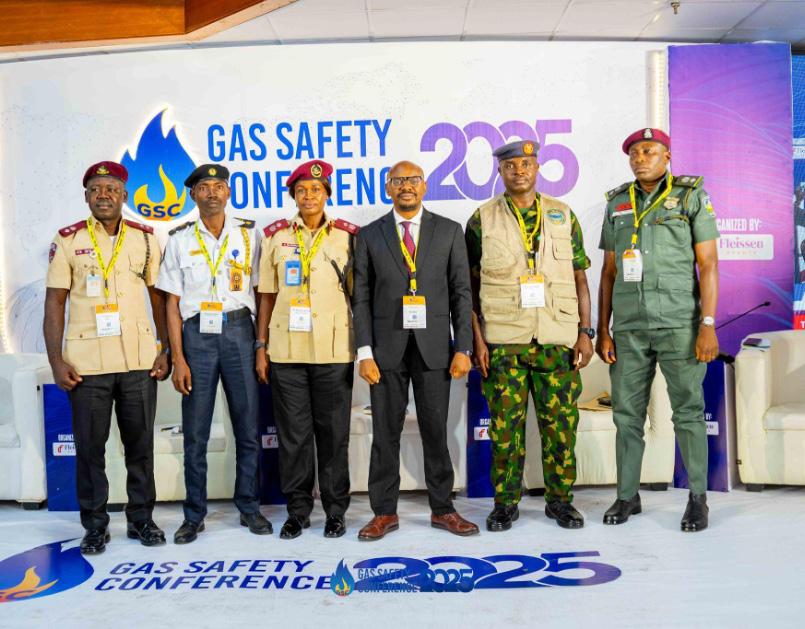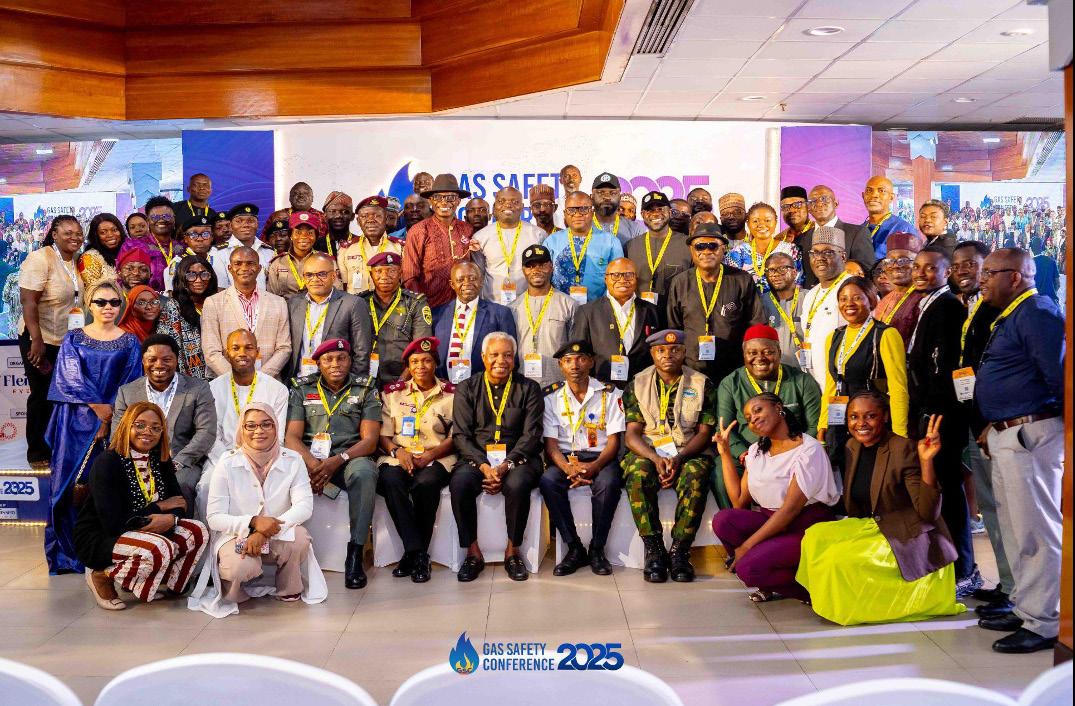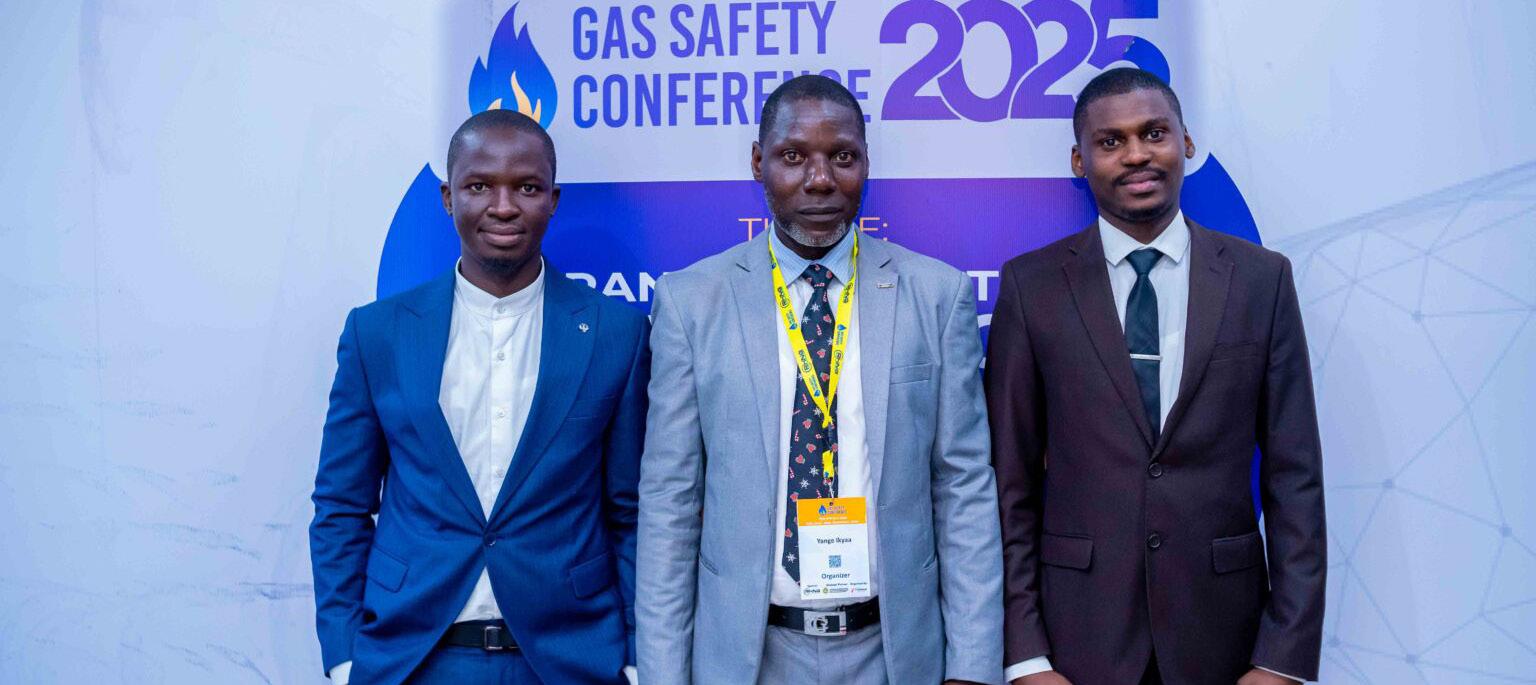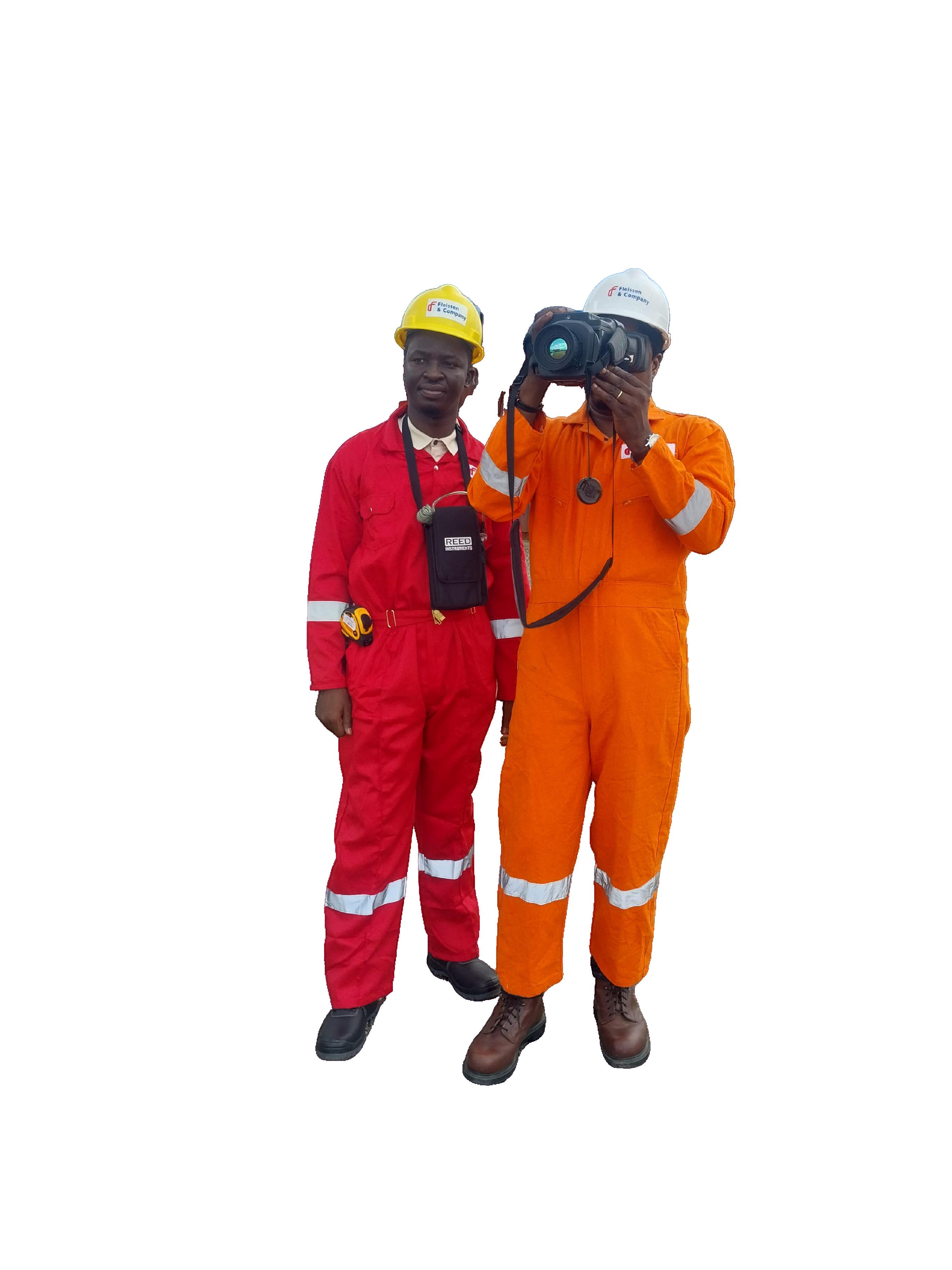| REPORT
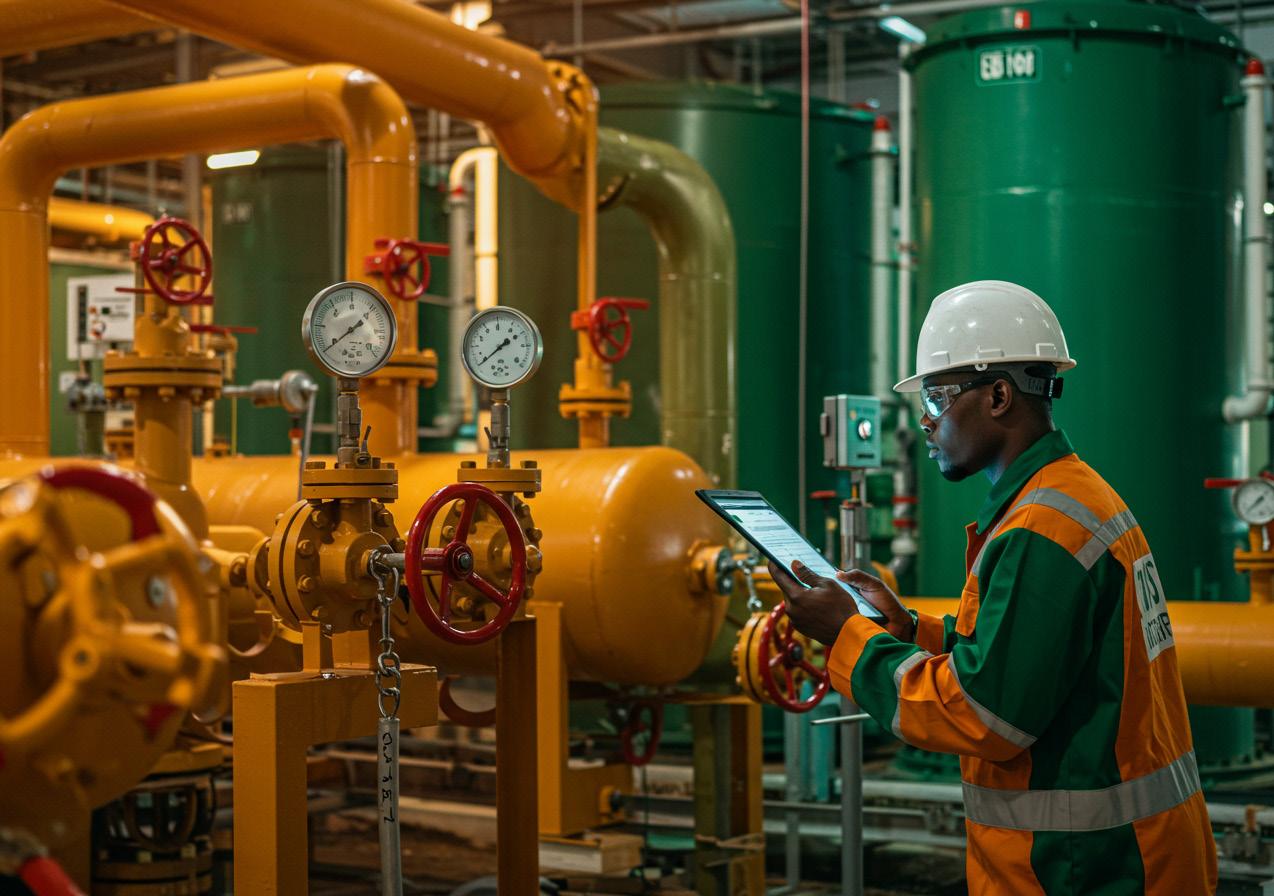

Appreciation
We wish to express our profound appreciation to our very supportive sponsors, who provided the funds that facilitated the smooth running of GSC 2025.
Sponsors

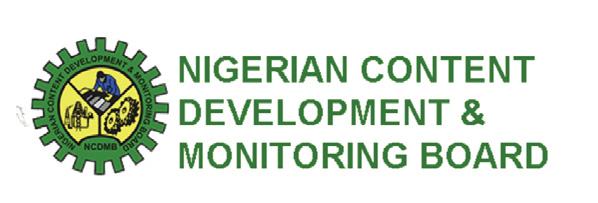
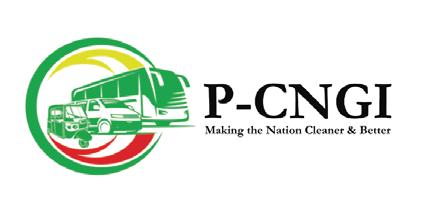
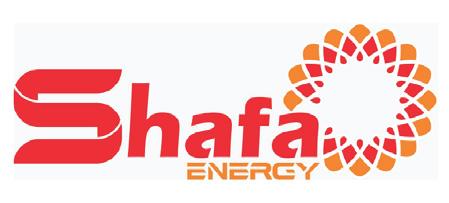


Endorsed by

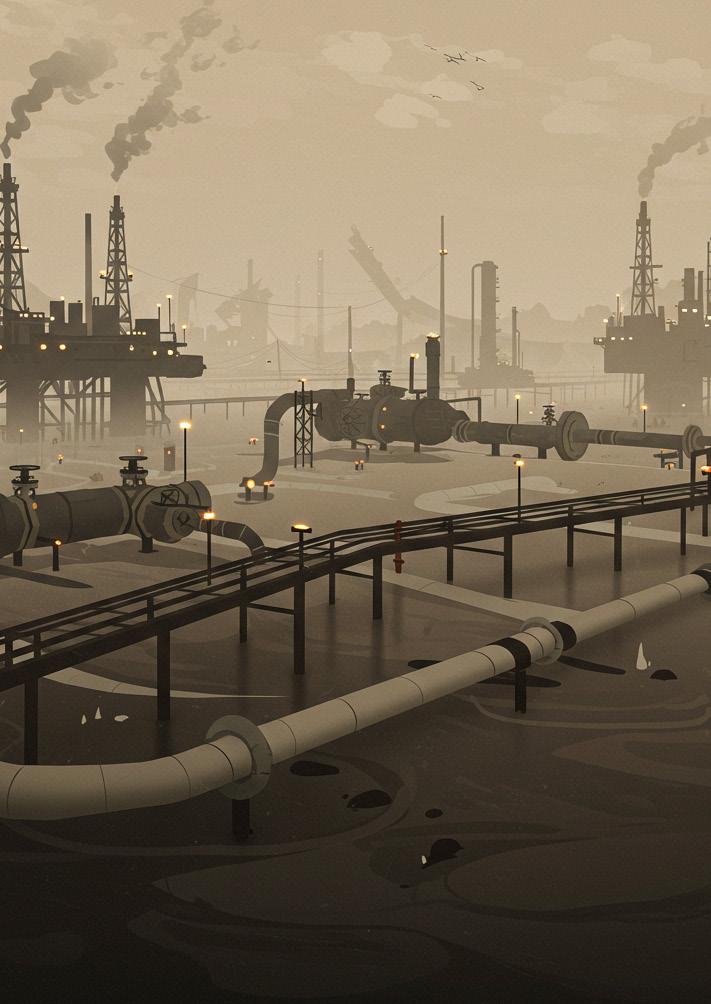
© Copyright Gas Safety Conference, Abuja 2025. All rights reserved.
No part of this publication may be reproduced or transmitted, in any form or by any means, electronic, mechanical, photocopying, recording or otherwise or stored in any retrieval system of any nature without the prior, written permission of the Gas Safety Conference, application for which shall be made to Fleissen Energy.
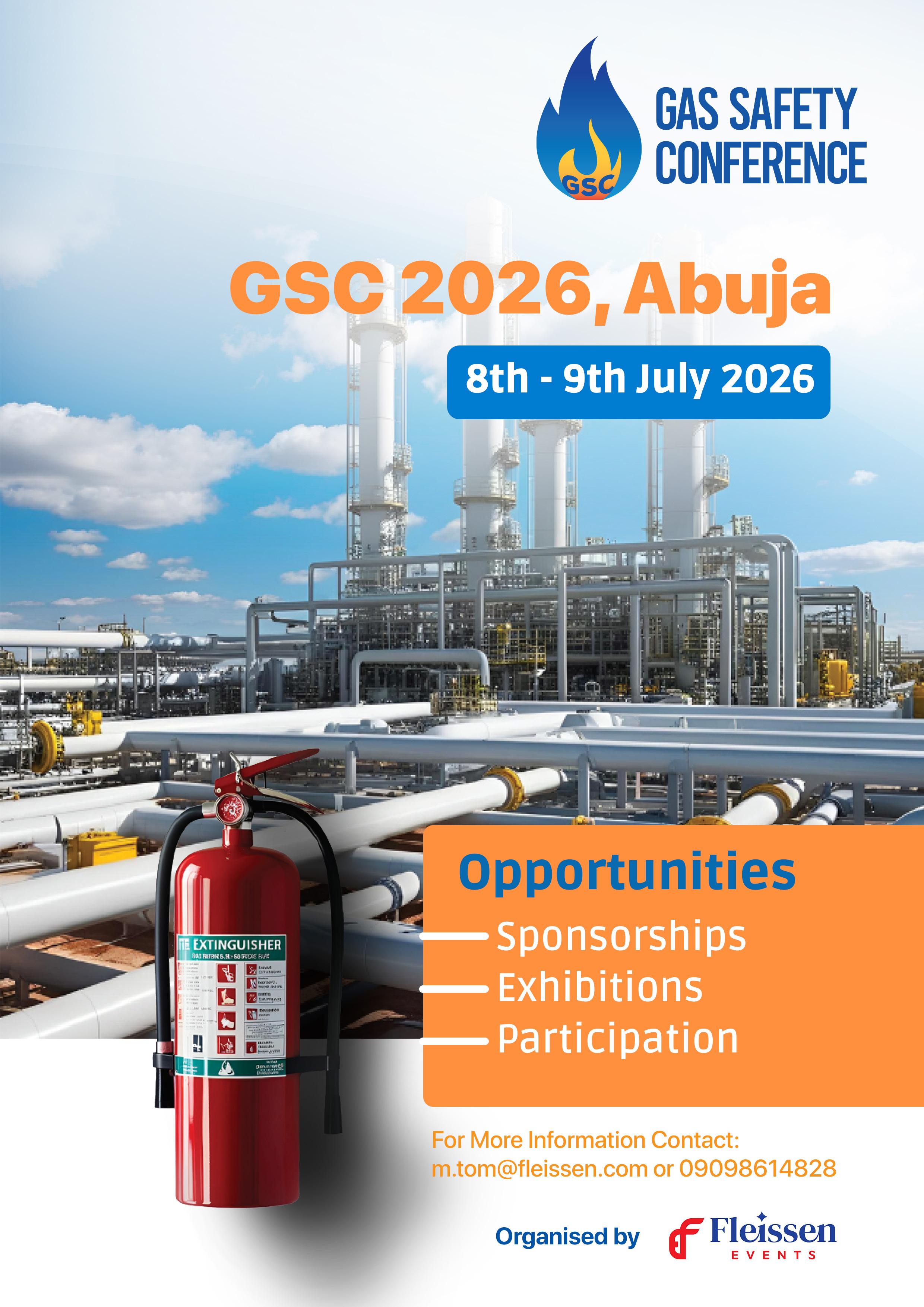
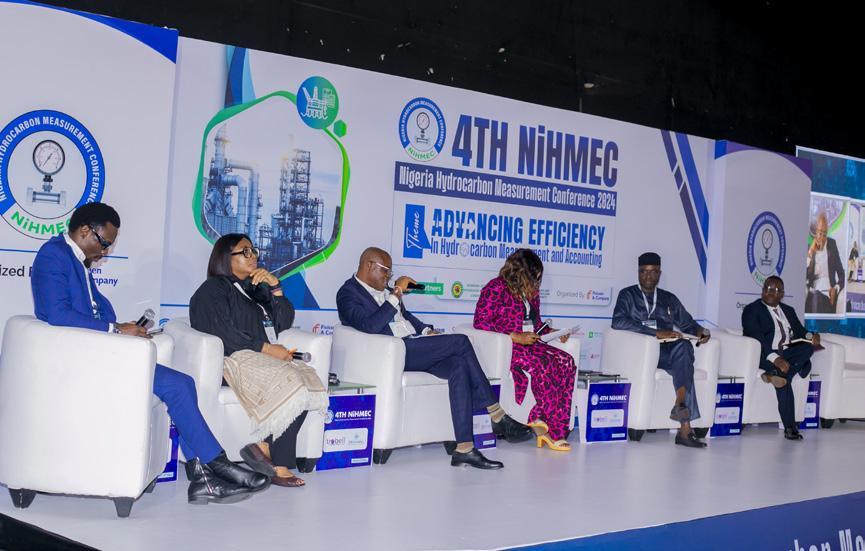

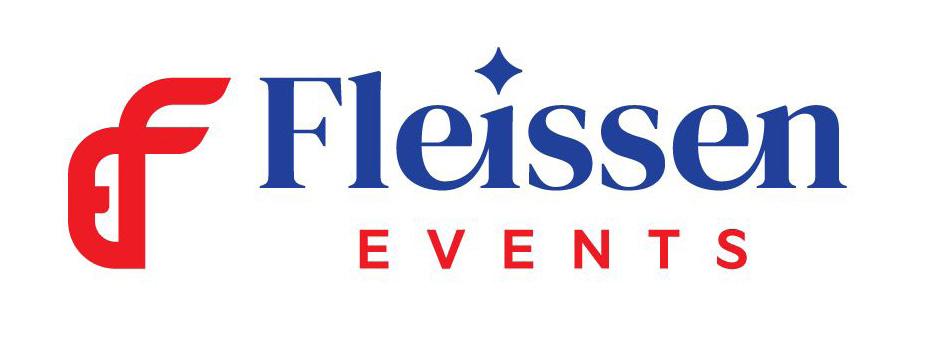

for ums that advance technical dialogue, shape regulatory thinking , and foster collaboration across Nigeria’s energy, infrastr ucture and climate transition sectors. We curate strategic conferences policy roundtables and multi-stakeholder platforms that align national priorities with private sector innovation and execution
stakeholders from acro ss the gas value chain—including re gulators, pro ducers distrib utors, emergency re sp onders, insurers engine ers and civil s o cie ty to forge a unifie d agenda for safe ty, c ompliance and op erational inte grity in Nigeria s evolving gas e c onomy
institutions le ad, p olicie s are shap e d, and tr ust is b uilt . O ur events are known for their dep th , cre dibility, and ability to mobilise national attention aro und critic al se c toral prioritie s
Our Event Portfolio
Gas Safe ty C onference Nigeria Hydro c arb on Me asurement C onference Annual Oil and Gas GHG Emissions Management For um
Gas Safety Conference (GSC)
A Nationa Platform for Industry-Wide Gas Safety and Accountability
gas sector GSC was established to address a critical gap: the lack of a unified national platform where gas safety is treated not as a compliance obligation, but as an industry-wide accountability framework.
Each year, GSC brings together sen or leaders across government, ndustry, professional associations, and the emergency response ecosystem to:
Share insights on safety performance, regulations, and innovations
Evaluate risk trends across gas production, processing, and distribution
Strengthen coordination between regulators, operators, and first responders
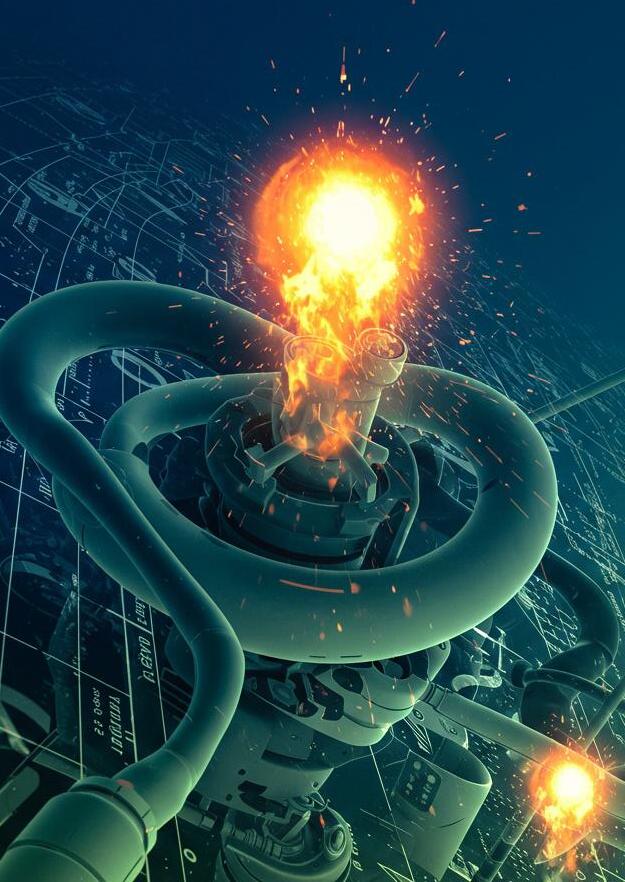
Promote enduser safety, workforce competence, and infrastructure resilience
Build public confidence in Nigeria’s transition to a gas-powered economy
The National Gas Safety Declaration, adopted at the 2025 edition, is a testament to the conference’s impact as a platform for rea commitments and measurable progress
n gas safety and operations across Nigeria.
To explore par tnerships, speaking oppor tunitie s, or par ticipate in future editions of our e vents, contact us at s.kanshio @ fleissen .com
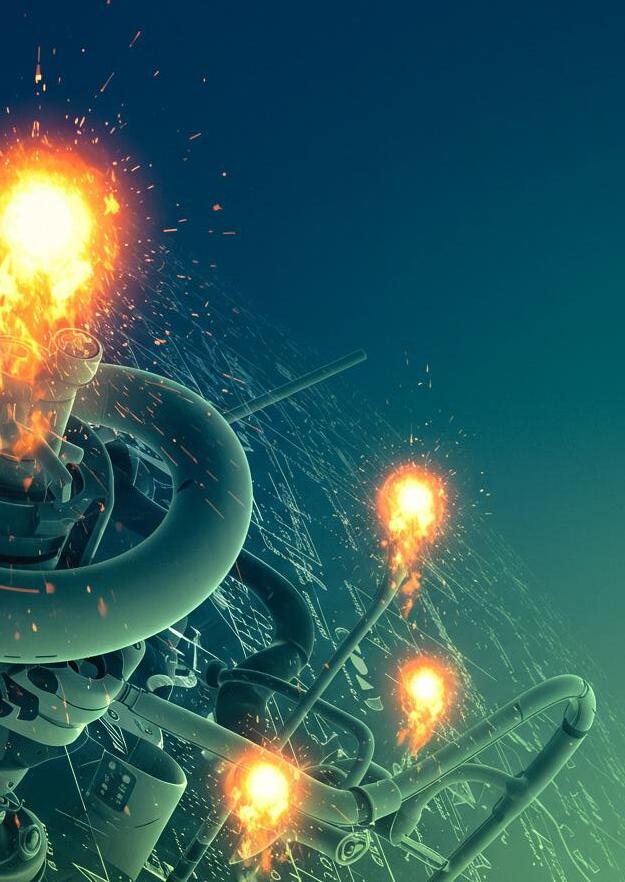
Infrastructure and End-User Safety: Strengthening Trust in LPG and Autogas Expansion
Emergency Preparedness and National Response: Gas Explosions and Road Accidents Involving Bulk Gas Distribution Vehicles – Real-World Experiences

Executive Brief
The Gas Safety Conference 2025 convened at a pivotal moment in Nigeria’s energy transition. Organised by Fleissen Events Ltd, in strategic partnership with the Nigerian Midstream and Downstream Petroleum Regulatory Authority (NMDPRA), the conference assembled over 200 participants across the gas value chain—regulators, producers, safety professionals, insurers, civil society, and emergency responders. Chaired by Mr. Osten Olorunsola, a respected energy leader and policy strategist, the event focused on the theme:
“Transition to a Natural Gas-Powered Economy: Safety, A Shared Responsibility.”
The discussions confirmed a fundamental shift in Nigeria’s energy narrative: safety is no longer a regulatory checkbox. It is now a strategic pillar for national trust, energy market maturity, and long-term economic resilience.
Key Takeaways
1. National safety consensus secured.
The unprecedented adoption of the National Gas Safety Declaration—signed by 26 industry-leading institutions and government bodies—was a defining moment. The Declaration sets out five actionable commitments to unify safety standards, strengthen workforce capacity, embed safety in infrastructure, scale public awareness, and institutionalise collaboration across the value chain. This represents Nigeria’s first formal cross-sector alignment on gas safety and provides a robust anchor for execution in policy, planning, and regulation.
2. Safety is now strategic, not procedural.
Safety emerged from every session not as a support function, but as a core determinant of project bankability, public confidence, and national reputation. Speakers emphasised that no energy transition can succeed without integrating safety from design to deployment—particularly as gas reaches homes, vehicles, and dense urban infrastructure.
3. Workforce competence is the weak link. The gap between safety intent and implementation often lies in unqualified personnel. The Institute of Safety Professionals of Nigeria (ISPON) revealed widespread credential fraud and called for the legal backing of a national, verifiable certification regime for HSE professionals. Competency-based certification must be enforced across all gas-related roles.
4. Public confidence is fragile but foundational
From misreported CNG incidents to unsafe roadside LPG refilling, public perception can derail market adoption. Misinformation spreads faster than regulation. A national campaign—localized, fact-based, and sustained—is now critical to demystify gas technologies and build end-user confidence.
5. Emergency systems must function as one Gas-related incidents—whether fires, explosions, or transport leaks—demand seamless, multi-agency coordination. NEMA, FRSC, Federal Fire Service, and Police Anti-Bomb
Squad demonstrated capacity but called for a unified command system, national emergency number, and shared SOPs. Public education must also include what to do when things go wrong.
Strategic Policy Recommendations
1. Regulation and governance
^ Codify the National Gas Safety Declaration as a live implementation roadmap, monitored annually with stakeholder scorecards.
^ Establish a Unified National Gas Safety Code, harmonising safety regulations across NMDPRA, SON, NUPRC, NADDC, NAICOM, and state authorities.
^ Enforce safety case approvals as a prerequisite for licenses across all segments—upstream, midstream, and downstream.
2. Human capital and professional standards
^ Mainstream safety education into secondary schools, technical colleges, and vocational programs— creating a future-ready, safety-literate workforce.
^ Develop and scale NBTE-tiered occupational standards for LPG and CNG conversion, inspection, and maintenance.
3. Emergency preparedness and national response
^ Adopt a single national 3-digit emergency number, integrating all gas-related incidents.
^ Institutionalise multi-agency simulation drills, held quarterly, across high-risk corridors and terminals.
^ Standardise post-incident reviews (within 72 hours) to capture learnings and continuously update SOPs.
Conclusion: From commitments to consequences
The Gas Safety Conference 2025 has set a new benchmark: a united declaration, cross-sector participation, and a compelling mandate for action. The signing of the National Gas Safety Declaration by 26 institutions was not ceremonial—it was directional. It is now the litmus test for regulatory seriousness, corporate responsibility, and institutional alignment.
4. Infrastructure and market operations
^ Introduce public-facing safety ratings for gas stations and conversion centres, based on verified audits.
^ Mandate QR-coded traceability for all gas cylinders, hoses, and tanks to validate testing, shelf life, and safety certification.
^ Enforce safety protocols for informal operators, transitioning roadside refillers into a regulated framework via training and incentives.
5. Innovation and local technology development
^ Establish a National Gas Safety Innovation Fund, supporting indigenous technologies in leak detection, risk prediction, and digital safety.
^ Incentivise adoption of smart safety systems through tax credits, regulatory fast-tracking, or concessional finance.
6. Communication and public engagement
^ Launch a national multilingual safety campaign, using trusted community voices and digital media to demystify gas use and build trust.
^ Create a verified public information protocol for incidents—ensuring that facts, not fear, shape public perception.
^ Publicly list certified engineers, technicians, and gas installers, accessible to consumers and regulators.
As Mr. Osten Olorunsola aptly concluded:
“This Declaration is for humanity, for the environment, and for our country. The burden of delivery is on all of us.”
To move forward, Nigeria must now translate consensus into execution—with accountability, urgency, and unwavering commitment to a gas economy that is not only cleaner and more inclusive—but safe by design.


Welcome Address by Dr. Mustapha Lamorde
Dr. Mustapha Lamorde formally opened the 2025 Gas Safety Conference with a compelling address that set the tone for the two-day deliberations. Speaking on behalf of the organisers—Fleissen Events and the Nigerian Midstream and Downstream Petroleum Regulatory Authority (NMDPRA)—as well as strategic partners, sponsors, and endorsers, Dr. Lamorde welcomed dignitaries, industry leaders, delegates, and technical experts from across Nigeria’s energy landscape.
Dr. Lamorde highlighted that the conference was designed to bring together a cross-section of key actors in the gas value chain—including upstream producers, midstream processors, downstream distributors, safety professionals, regulators, and international partners—to examine the systemic, operational, and behavioural dimensions of gas safety.
“Transition to a Natural Gas-Powered Economy: Safety, A Shared Responsibility” aligns with Nigeria’s long-term vision to reposition its energy sector for a cleaner, safer, and more sustainable future.
In his remarks, Dr. Lamorde emphasized the critical importance of the conference theme: “Transition to a Natural Gas-Powered Economy: Safety, A Shared Responsibility.” He noted that this theme aligns with Nigeria’s long-term vision to reposition its energy sector for a cleaner, safer, and more sustainable future. As the nation accelerates its shift from a petroleum-dominated energy mix to one underpinned by natural gas, he stressed that safety must remain a non-negotiable pillar of that transition.
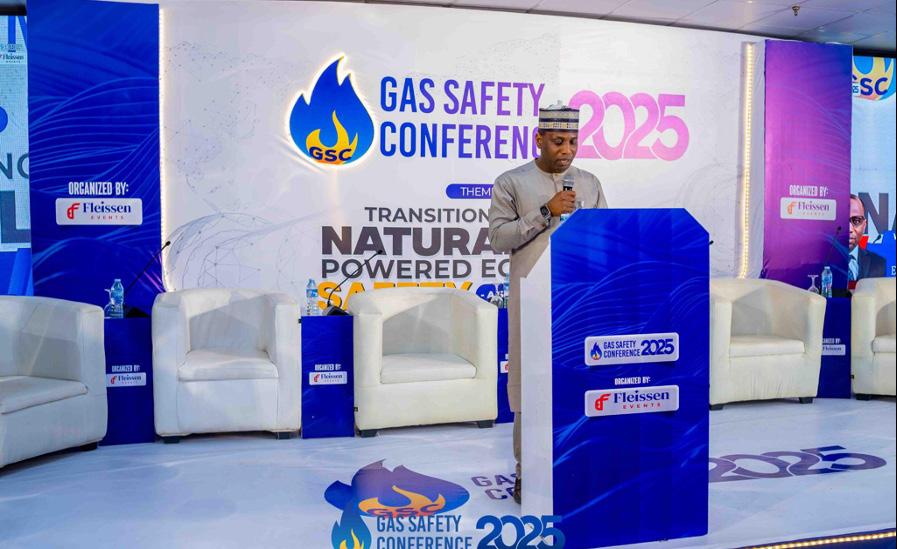
He reiterated that safety must not be treated as a procedural add-on, but rather institutionalised as a culture. He urged participants to collectively explore practical strategies for embedding safety across every layer of the gas value chain, from field operations and infrastructure development to policy formulation and end-user education.
Importantly, Dr. Lamorde called for a candid examination of emerging risks, global best practices, and regulatory innovations. He encouraged delegates to contribute meaningfully to the sessions, share lessons learned from real-world experience, and identify opportunities for continuous improvement in Nigeria’s gas safety ecosystem.
In his concluding remarks, Dr. Lamorde extended special appreciation to the Honourable Minister of Petroleum Resources (Gas), the Honourable Minister of Information and National Orientation, the Chief Executive of NMDPRA, and other distinguished stakeholders for their unwavering support. He acknowledged the efforts of the plenary speakers and organisers for curating a timely and strategic platform.
Dr. Lamorde affirmed that the Gas Safety Conference must serve not only as a knowledge-sharing forum, but also as a catalyst for national commitment to gas safety as a shared responsibility—anchored in the protection of lives, assets, and the environment.
He officially welcomed all participants to the 2025 Gas Safety Conference and wished them fruitful deliberations. �

Ministerial Goodwill Message
Rt. Hon. Ekperikpe Ekpo, Minister of State for Petroleum Resources (Gas)
At the 2025 Gas Safety Conference, Dr. Mustapha Lamorde delivered a goodwill message on behalf of the Honourable Minister of State for Petroleum Resources (Gas), Rt. Hon. Ekperikpe Ekpo. In his remarks, the Minister emphasized that Nigeria’s transition to a gas-powered economy must be anchored on safety, collaboration, and competence.
He began by stating that natural gas, Nigeria’s most abundant energy resource, offers a strategic opportunity for energy security, industrialization, and climate mitigation. He acknowledged that the country is no longer merely an oil economy but is increasingly positioning itself as a gas-driven nation. This vision is being advanced through several national initiatives, including the Decade of Gas, the National Gas Expansion Programme, and the Presidential CNG Initiative.
He outlined four priority areas that should guide Nigeria’s gas safety agenda:
^ Safe Operations: All gas-related activities must meet international safety standards and be conducted with the highest regard for human life and environmental protection.
^ Regulatory Framework: A strong and enforceable regulatory system must hold operators accountable and ensure continuous compliance.
^ Industry Collaboration: Stakeholders must work together to share knowledge, lessons, and innovations that strengthen safety outcomes.
^ Capacity Building: A technically competent workforce is essential to sustaining high safety standards across the gas value chain.
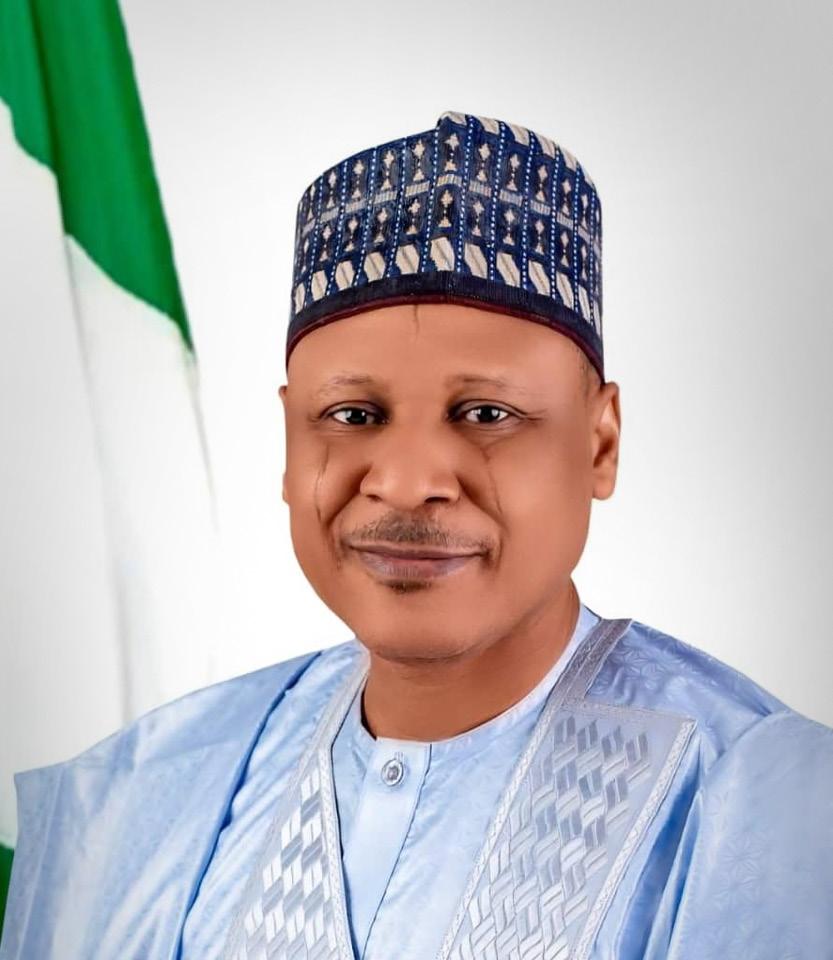
“The safe development and delivery of gas—from upstream production to power generation, transportation, and household use—requires a shared sense of responsibility among all stakeholders.”
However, the Minister warned that the safe development and delivery of gas— from upstream production to power generation, transportation, and household use—requires a shared sense of responsibility among all stakeholders. This includes government, operators, civil society, and the general public.
The Minister reaffirmed the government’s commitment to building a gas economy that is not only efficient and inclusive but also safe, resilient, and future-proof. He concluded by urging the industry to match investment in infrastructure with equal investment in safety systems, training, and public awareness.�
Key Takeaways and Actionable Recommendations
Ê Safety must be built into every gas investment from day one—not treated as an afterthought. Every project, policy, and partnership must embed safety as a core value, not just a compliance requirement.
Ê Regulators must strictly enforce safety rules and hold operators fully accountable for lapses. A credible regulatory framework means that no operator is above the law and no breach goes unchecked.
Ê Industry players must stop working in silos and start building a unified safety culture. Collaboration—not competition—will drive long-term resilience and prevent costly accidents.
Ê Nigeria must invest in training the next generation of gas professionals to manage risk responsibly. A gas-powered economy needs a safety-conscious workforce equipped with practical, up-to-date skills.
Ê Public awareness must go beyond campaigns—safety education must reach homes, schools, and drivers. From keke riders to cooks, all end-users must be trained to handle gas safely in daily life.
Ê The Gas Master Plan must include clear safety goals and trackable progress indicators. Safety should be measurable, reported, and reviewed as rigorously as production or revenue targets.
Goodwill Message By the Honourable Minister of Information and National Orientation
Alhaji Mohammed Idris, FNIPR
The Honourable Minister of Information and National Orientation, Alhaji Mohammed Idris, extended his warm greetings to participants at the 2025 Gas Safety Conference, in a goodwill message delivered by Mr. Ogbodo Chinasa Nnam, the Permanent Secretary of the Ministry.
He commended Fleissen Events and the Nigerian Midstream and Downstream Petroleum Regulatory Authority (NMDPRA) for convening a timely and nationally relevant gathering. According to the Minister, the conference theme reflects Nigeria’s strategic energy transition goals and highlights the importance of collaborative responsibility in ensuring public safety and national trust in the expanding natural gas economy.
“Gas safety is not only a matter of regulation and compliance but also a function of public knowledge, perception, and behavior.”
The Honourable Minister emphasized that gas safety is not only a matter of regulation and compliance but also a function of public knowledge, perception, and behavior.
As Nigeria moves towards greater adoption of cleaner energy sources such as LPG, CNG, LNG, and piped gas, he underscored the increasing urgency for effective communica-
Key Takeaways:
Ê The Ministry views gas safety not only as a technical issue but as a behavioural and informational one, requiring targeted public orientation and strategic communication.
Ê Ensuring safety in the gas economy is a collective mandate involving government, industry, media, civil society, and all Nigerians.
tion, public awareness, and media coordination.
He reiterated the Ministry’s commitment to leading culturally appropriate, inclusive, and fact-based information campaigns that support citizen safety and reduce misinformation related to gas usage across homes, industries, and transport. He recognized the Gas Safety Conference as a vital national platform for fostering dialogue, improving safety consciousness, and building public trust through multi-stakeholder engagement.
In closing, the Minister reaffirmed the Ministry’s support for initiatives that promote responsible communication and build a more energy-literate nation. He wished all delegates fruitful deliberations and encouraged them to contribute meaningfully to the safety agenda for Nigeria’s gas future. �
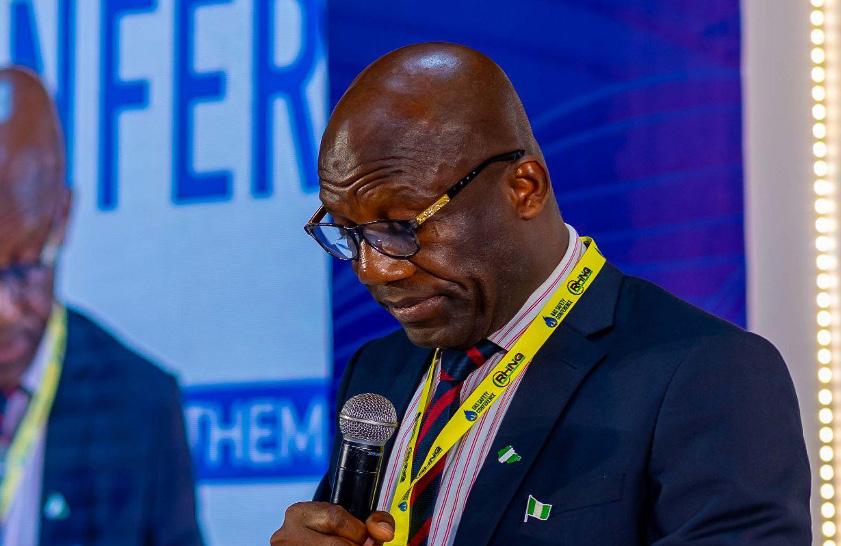
Ê Effective, fact-based public education is essential to dispel fear, reduce risk, and build public trust in gas technologies and infrastructure.
National Gas Safety Declaration
Presented by: Mr. Osten, Chairman, Gas Safety Conference

In a compelling address at the Gas Safety Conference 2025, Mr. Osten, Chairman of the GSC and leader of the National Gas Safety Declaration session, delivered an urgent call to action. Speaking to a diverse audience that included regulators, engineers, industry professionals, emergency responders, information specialists, and civil society actors, he emphasized the critical need to embed safety as a core foundation in Nigeria’s evolving gas economy.
Nigeria stands at the threshold of a clean energy revolution. From compressed natural gas (CNG) and liquefied petroleum gas (LPG) to liquefied and piped natural gas (LNG and PNG), these cleaner fuels are reaching millions of homes, businesses, transport systems, and industries across the country. Gas utilization is already reducing energy poverty, powering inclusive industrial growth, lowering emissions, and supporting the shift away from polluting fuels.
However, as access and usage expand, the responsibility to ensure safety becomes even more pressing. Mr. Osten called on all stakeholders—regulators, producers, marketers, transporters, insurers, emergency responders, and end users—to play their part in protecting lives, property, and the environment.
He outlined three core motivations behind the Declaration:
1. Protection of Human Life
Workers in the gas sector often operate in complex and hazardous environments, including platforms, confined spaces, pressurized systems, and areas with flammable materials. Safety measures are essential to ensure that every worker returns home safely.
2. Environmental Stewardship
Preventing gas leaks, flaring, venting, and contamination is vital for protecting Nigeria’s biodiversity, preserving ecosystems, and safeguarding public health.
3. Regulatory Compliance and the License to Operate
Given the industry’s highly regulated nature, gas operators must comply with both national and international safety standards to maintain their legal and social license to operate.
The Declaration was formally adopted during a signing ceremony and outlines five key commitments that reflect
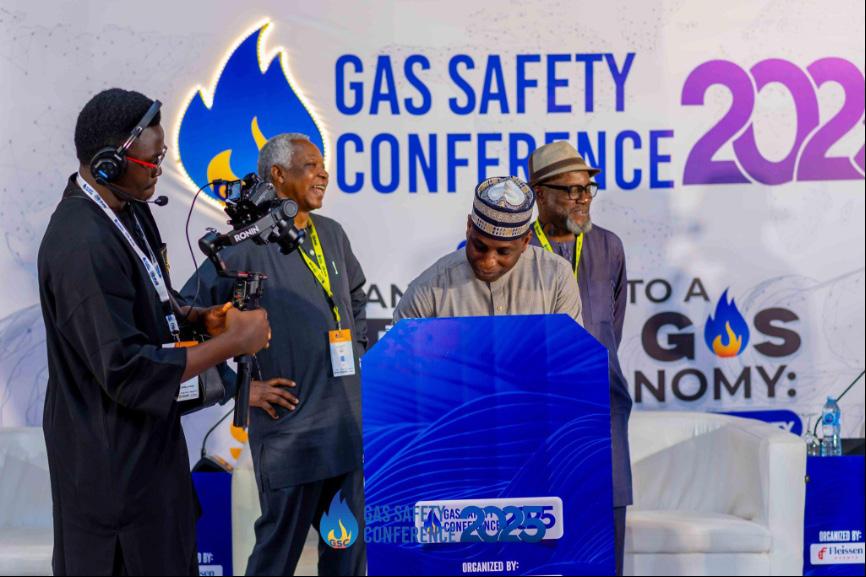
Nigeria’s determination to institutionalize gas safety as a national priority:
The Five Commitments
1. Promote a Unified Safety Framework Across the Gas Value Chain
Stakeholders committed to supporting the development, adoption, and enforcement of harmonized safety standards covering the entire gas value chain—from upstream production and processing to downstream transmission, distribution, and final usage.
2. Strengthen Workforce Capacity and Professional Certification
The Declaration calls for mandatory training and certification for all personnel involved in gas operations, including installers, technicians, operators, and emergency responders. Both public and private institutions are expected to integrate capacity building into their standards.
3. Institutionalize Safety in Infrastructure Development
Safety considerations will be built into the planning, design, and approval of pipelines, vehicle conversion centers, gas terminals, residential estates, and public infrastructure projects.

4. Drive End-User Awareness and Public Confidence
Stakeholders pledged to increase investment in public awareness campaigns and educational outreach focused on safe gas handling, appliance usage, and emergency preparedness. These campaigns will target homes, schools, businesses, and transport operators.
5. Foster Multi-Stakeholder Collaboration on Safety Systems
Participants committed to fostering inter-agency coordination and cross-sector collaboration involving ministries, regulatory agencies, professional bodies, development partners, and civil society to build robust, integrated safety systems.
In his closing remarks, Mr. Osten stressed that Nigeria’s gas sector cannot afford complacency. While the country has so far avoided major disasters, the inherent volatility of gas demands proactive, coordinated, and transparent action. Safety must be seen not just as a technical issue but as a national imperative for protecting workers, communities, and the broader economy.
“This Declaration is for humanity, for the environment, and for our country,” he concluded. “Let us commit to a safe gas future for Nigeria.” �
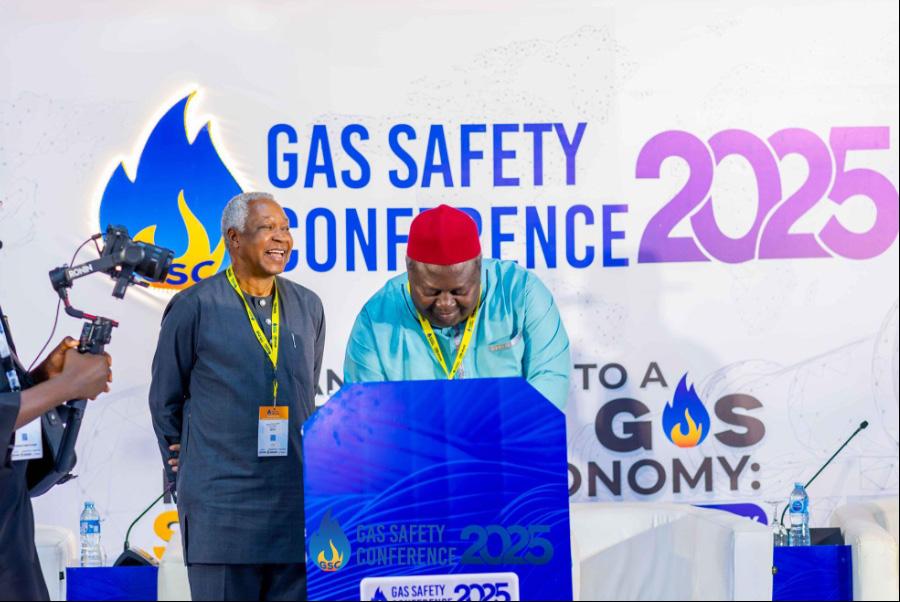
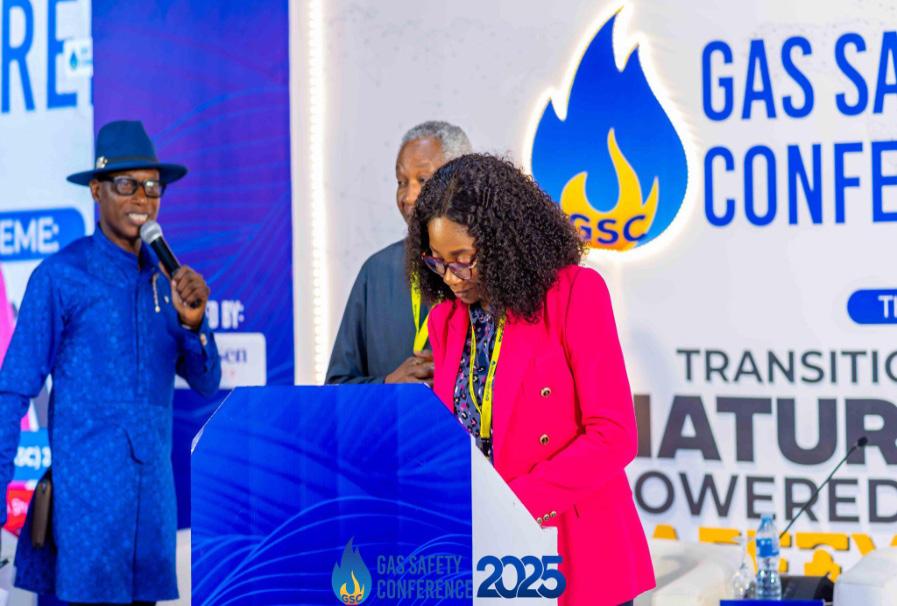

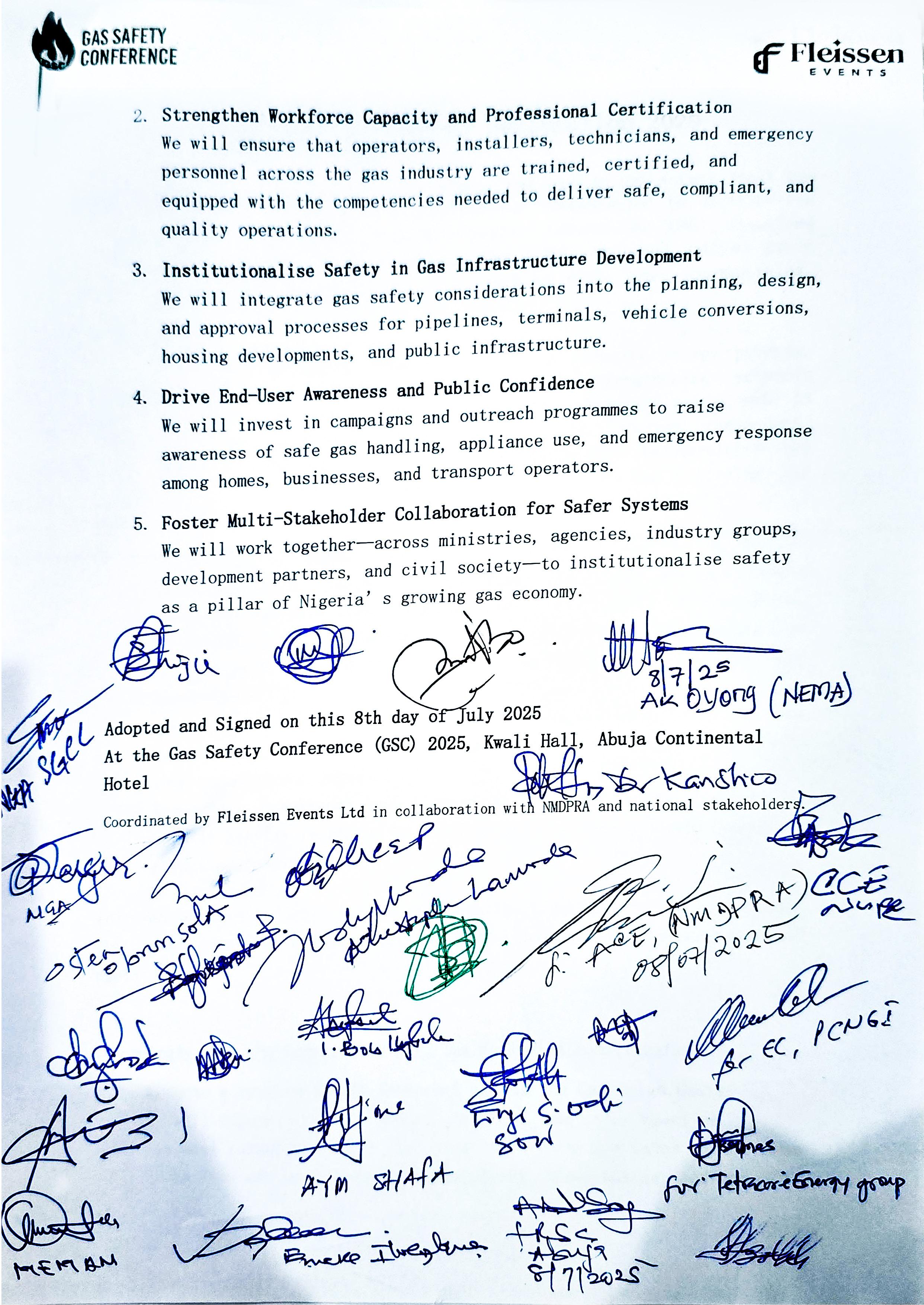
Keynote Address
Leveraging Regulation to Accelerate Nigeria’s Gas Economy Safely
Delivered by: Mr. George Ene Ita, Director of Public Affairs, NMDPRA (on behalf of Engr. Farouk Ahmed, FNSE)
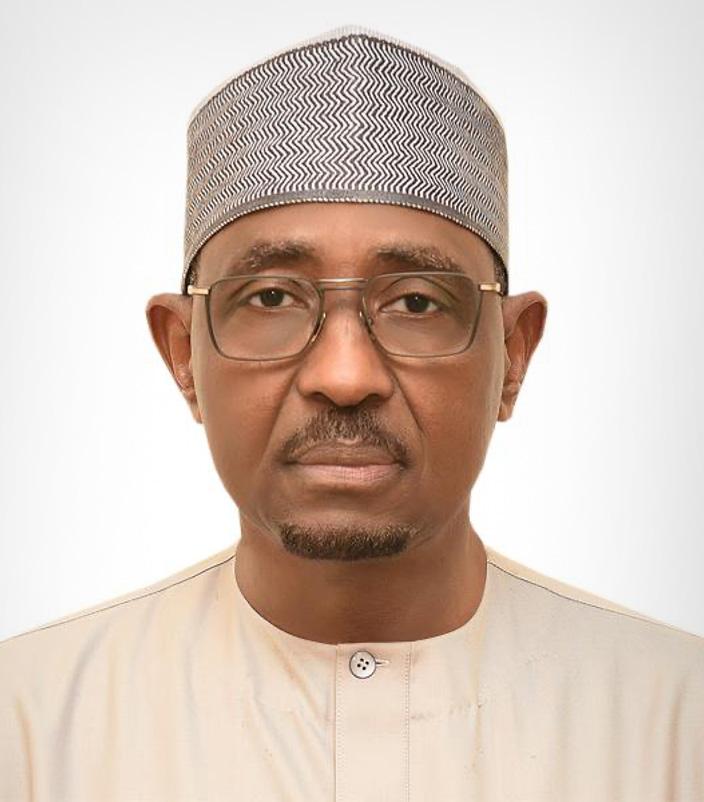
At the 2025 Gas Safety Conference, the Nigerian Midstream and Downstream Petroleum Regulatory Authority (NMDPRA) reaffirmed its leadership in building a safe and sustainable gas economy.
Delivering the keynote address on behalf of the Authority Chief Executive, Engr. Farouk Ahmed, the Director of Public Affairs, Mr. George Ene Ita, conveyed the Authority’s unwavering support for the objectives of the conference and expressed deep appreciation to the organizers—Fleissen Events and the Gas Safety Conference team—for convening such a timely and strategic industry dialogue.
As a proud sponsor of the conference, the Authority emphasized that gas safety must sit at the heart of Nigeria’s energy transition. In his prepared remarks, Engr. Farouk described the conference theme—Leveraging Regulation to Accelerate Nigeria’s Gas Economy Safely—as both apt and necessary, especially as Nigeria pushes forward with national gas utilization programs.
He began by reflecting on Nigeria’s vast but underutilized gas reserves—over 200 trillion cubic feet of proven natural gas—noting that while the country is well-endowed, it has historically struggled with infrastructure deficits, weak compliance enforcement, and policy fragmentation. The enactment of the Petroleum Industry Act (PIA) 2021, he said, has positioned NMDPRA with a robust legal foundation to correct this trajectory and create a modern, performance-based regulatory environment.
Engr. Farouk emphasized that regulation must be seen not just as control, but as a strategic enabler—one that drives innovation, attracts investment, and builds public trust.
He stressed that the Authority’s licensing framework now requires that no gas facility may commence operations without rigorous assessment of its safety architecture and system integrity.
He reaffirmed that the Authority is aligning its regulations with global safety standards and has intensified compliance monitoring across gas processing plants, pipelines, CNG and LNG infrastructure, and distribution networks. The ultimate aim, he noted, is to ensure all facilities operate with risk levels “as low as reasonably practicable.”
However, the keynote speaker cautioned that regulation alone is not enough. Safety, he said, must evolve into an internalized value system embraced by every actor in the value chain—from operators and technicians to drivers and regulators. “Every incident we prevent,” he noted, “is a human life protected, an asset preserved, and a national reputation safeguarded.”
He concluded by calling for a unified safety culture across Nigeria’s gas ecosystem, one in which regulators, operators, and citizens view safety not as a legal requirement, but as a moral and professional obligation. He urged stakeholders to go beyond minimal compliance and commit to safety as a shared responsibility and a national imperative. �

Key Takeaways and Actionable Recommendations
Ê Safety must be embedded into regulation as a catalyst for growth—not as an administrative burden. A safe gas economy is also a bankable and investable gas economy.
Ê No gas facility should operate without regulatory approval of its safety systems. Licensing must remain conditional on rigorous risk assessments and design validation.
Ê Nigeria must align its gas safety framework with global best practices. Benchmarking against international standards ensures operational excellence and global competitiveness.
Ê Regulators must adopt data-driven, proactive compliance monitoring across all gas facilities. Routine inspections and digital tracking systems should drive transparency and accountability.
Ê Safety must become an internalized culture, not just a box to tick. Every actor—from senior managers to field operators—must own safety as a personal and professional duty.
Ê Every safety failure has a human, economic, and reputational cost. Preventing incidents saves lives, protects assets, and strengthens public trust.
Ê The Petroleum Industry Act should be fully implemented to sustain licensing, oversight, and enforcement. Stakeholders must align their operations with the spirit and letter of the PIA.
Ê NMDPRA commends and supports platforms like the Gas Safety Conference for advancing public-private collaboration on safety. Industry events that promote dialogue, learning, and alignment are essential to a resilient gas economy.

Institutionalizing Gas Safety Regulations in Nigeria:
Towards a Safer, Standards-Based Gas Economy

The first plenary session of the 2025 Gas Safety Conference, titled Institutionalizing Gas Safety Regulations in Nigeria, convened a high-level panel of regulatory authorities, safety professionals, and standardization experts to address one of the most urgent and foundational issues in Nigeria’s gas transition—how to embed safety regulations as a core, enforceable, and sustainable part of the national gas architecture.
The session was moderated by Engr. Emeka, a seasoned safety professional and Fellow of the Institute of Safety Professionals of Nigeria (ISPON). In his opening remarks, he contextualized the conversation by emphasizing that institutionalization meant more than having rules and guidelines. It meant embedding safety as a norm, culture, and legal standard across the gas value chain—from upstream exploration to last-mile consumption. He challenged participants to identify ways to ensure fragmented safety standards were consolidated into enforceable frameworks and that knowledge of these frameworks reached the people who needed it most—regulators, operators, contractors, and end-users.
The Foundation: Standards, Compliance, and Certification
Representing the Standards Organisation of Nigeria (SON), Engr. Samuel began by highlighting SON’s three foundational pillars of gas safety: Standards, Compliance, and
Certification. He explained that standards define the expected safety benchmarks for products, equipment, and systems, while compliance ensures operators adhere to these requirements. Certification, he stressed, serves as the formal evidence that personnel, procedures, and assets meet those expectations.
He disclosed that SON had recently developed over 80 standards for the autogas and LPG sectors, covering equipment specifications, installation practices, and operational procedures. Crucially, these standards were not developed in isolation. Rather, SON engages stakeholders from industry, government, and civil society during every phase of the standards development process. Yet, despite this progress, SON noted that awareness of these standards remained low, limiting their real-world impact.
Enforcement and Regulatory Coordination: NMDPRA’s Perspective
Engr. Oliver, representing the Nigerian Midstream and Downstream Petroleum Regulatory Authority (NMDPRA), emphasized the centrality of regulation in maintaining a level playing field. Regulation, he said, serves as a “denominator”—a tool that ensures both large and small players operate within clearly defined safety boundaries. He described NMDPRA’s regulatory structure, which spans from legal Acts to implementation guidelines, checklists, and consent protocols that guide daily operations.
One of the major challenges identified by NMDPRA was the widespread “check-the-box” mentality, where operators treat safety requirements as bureaucratic hurdles rather than essential practices. He called for a shift in mindset, from compliance to safety culture, and urged industry players to view safety not as an obligation but as a non-negotiable element of operational integrity.
NMDPRA also highlighted the need for greater public awareness and end-user education, especially as gas expands into domestic and transport applications. He warned that with-
out adequate public safety education, even well-structured regulations could fall short in protecting lives.
Upholding Safety from the Source: The Upstream Perspective
Speaking for the Nigerian Upstream Petroleum Regulatory Commission (NUPRC), Engr. Emmanuel Akinyemi underscored the critical importance of embedding safety at the start of the gas value chain. He argued that NUPRC, which regulates exploration and production, effectively “gives birth” to the entire gas sector, and as such, must ensure that safety is embedded from subsurface operations through to gas separation and transmission.
He cited the Upstream Petroleum Safety Regulations 2024, which mandate that every operator must prepare and obtain approval for a detailed safety case as a prerequisite for licensing. A safety case includes hazard identification, risk analysis, mitigation measures, emergency preparedness, and operational safeguards. Any operator unable to meet these requirements would be denied a license—irrespective of their financial or political standing.
NUPRC further noted a disturbing trend of “watermelon green” reporting, where safety dashboards showed compliance (green) on paper but revealed underlying risks (red) upon inspection. He referenced real-life incidents, including gas blowouts and fatalities, to stress the need for authentic, verifiable compliance and the elimination of shortcuts in safety reporting.
Competency, Certification, and Human Capital: The Role of ISPON
Engr. Steven Udeze, President of the Institute of Safety Professionals of Nigeria (ISPON), spoke passionately about the deficit of competence among those tasked with overseeing gas safety—especially within contractor firms. He described
Key Takeaways & Action Points
a disturbing industry culture where HSE officers are hired not for their qualifications but based on personal connections, and where companies duplicate safety management systems without understanding or implementing them.
He called attention to the proliferation of unregulated safety training providers, particularly during ISPON’s period of internal crisis, which led to the issuance of forged and unverifiable safety certificates. Since his assumption of office in October 2024, Engr. Udeze disclosed that ISPON had launched a nationwide certificate validation and cleanup exercise, introduced a five-level safety certification framework, and commenced efforts to embed regulatory training into its curriculum.
He advocated for early safety education, suggesting that awareness and culture-building should start from primary and secondary school levels—not only when individuals enter the workforce. He also appealed for stronger legislative support to ensure that only certified professionals are allowed to manage safety-sensitive operations.
Additional
Contributions and Public Concerns
Participants raised pertinent concerns about environmental impacts, particularly gas flaring and the lack of environmental safeguards in gas approval processes. Regulators responded by highlighting ongoing efforts to monitor and control emissions through point-source tracking, asset integrity audits, and updated environmental safety standards. However, it was acknowledged that more proactive enforcement and inter-agency collaboration were needed.
The session also highlighted the importance of verifiable certification, public accountability, and transparency in safety reporting, calling for open databases where operators and employers could confirm the qualifications of safety professionals. �
The session concluded with a strong consensus that institutionalizing gas safety is both a technical and cultural challenge. The following actionable takeaways were endorsed:
Ê Mandate Competency-Based Certification
Regulatory agencies and private sector employers must require that all safety personnel hold verifiable, ISPON-accredited certifications. National agencies should jointly establish a digital certificate validation portal accessible to employers, regulators, and the public.
Ê Strengthen Public Awareness and End-User Education
As gas adoption expands into homes and vehicles, there is an urgent need for public-facing safety campaigns, especially targeted at informal sector users
(e.g. tricycle drivers, roadside vendors). This should be co-led by NMDPRA, SON, and local governments.
Ê Embed Safety Education in School Curricula
Federal and state ministries of education should partner with ISPON to mainstream safety education into secondary school science and civic studies curricula. Gas safety should become part of the national consciousness early in life.
Ê Enforce Safety Case Approval for All Operators
NUPRC must maintain its zero-tolerance policy for unsafe operations by continuing to deny licenses to
upstream operators who fail to meet safety case requirements. This same principle should be extended across the midstream and downstream sectors.
Ê Eliminate “Check-the-Box” Compliance Culture
Regulatory authorities should adopt audit-based, outcome-focused approaches to safety compliance that go beyond paperwork. Operators must demonstrate actual implementation of safety protocols during routine and unannounced inspections.
Ê Update and Harmonize Regulatory Frameworks
A coordinated regulatory review is needed to elim -
inate fragmentation, harmonize standards across agencies, and develop a unified National Gas Safety Code. This code should be enforceable, accessible, and updated regularly with stakeholder input.
Ê Empower ISPON Through Legal Recognition Government agencies should recognize ISPON as the statutory professional body for safety practitioners and require its certification for all gas-related HSE roles. This includes embedding ISPON qualifications in gas licensing requirements.
In closing, the panel agreed that Nigeria cannot afford to treat gas safety as an afterthought. With the country’s gas ambitions expanding rapidly under the “Decade of Gas,” safety must be institutionalized not only as a regulatory requirement but as a national value. It is not just about equipment or infrastructure—it is about protecting people, preserving the environment, and building a
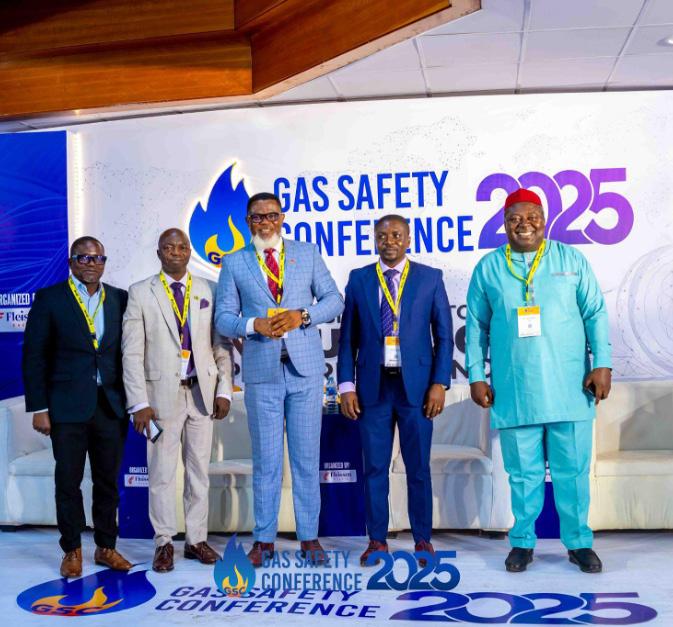

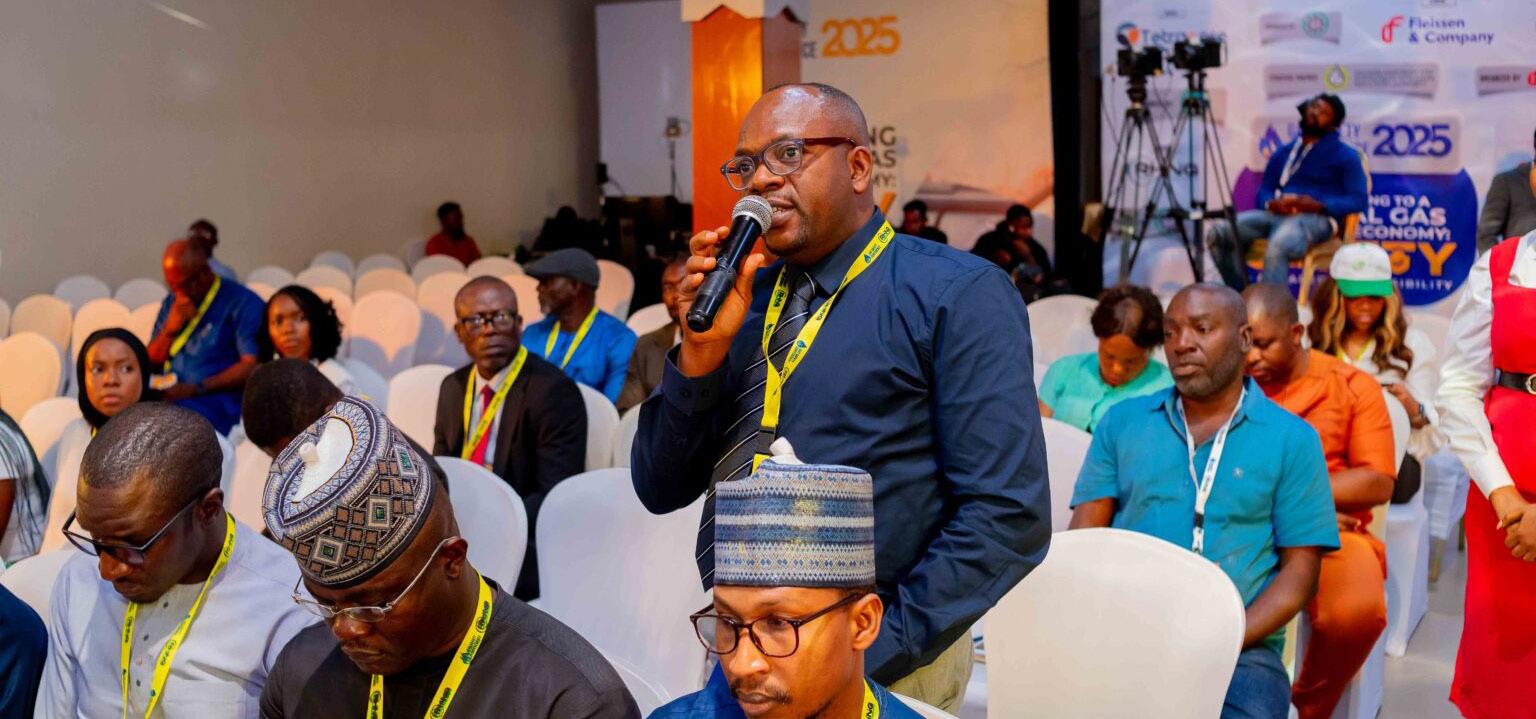
Driving Operational Excellence through Safety Innovation
Presenter: Mr. Adekoya Adeyemi James, Group Head, HSE & Technical Services, Tetracore Energy Group
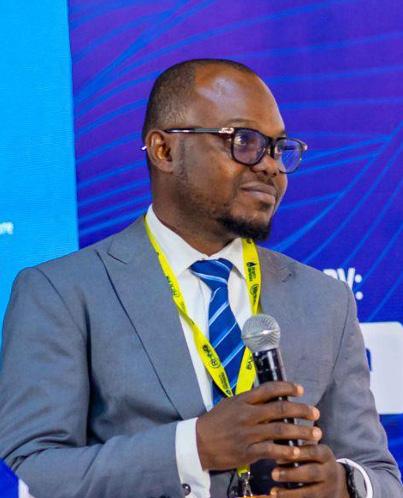
Mr. Adekoya Adeyemi James delivered a compelling technical presentation that highlighted Tetracore Energy Group’s integrated approach to operational safety in the Nigerian gas value chain. The session provided a rare, practical insight into how an indigenous energy company is applying international safety standards, real-time risk management, and a deeply institutionalized safety culture across its operations—spanning compressed natural gas (CNG), mini-LNG, pipeline systems, and power generation.
Opening his presentation, Mr. Adekoya emphasized that Tetracore’s corporate philosophy is anchored on delivering clean, affordable, and reliable energy to industries and communities, while ensuring zero compromise on safety, environmental stewardship, and technical quality. The Group has achieved ISO 9001:2015 certification from Bureau Veritas and is actively working toward ISO 45001:2018 (Occupational Safety) and ISO 14001:2015 (Environmental Management), signaling a strong commitment to integrated management systems.
Tetracore currently delivers over 70 million standard cubic feet of gas per day (MMSCFD) and operates a 6.1 MMSCFD CNG facility, with plans to expand to 15 MMSCFD and further roll out mini-LNG projects in Northern Nigeria. These operations are underpinned by rigorous adherence to global engineering codes such as ASME Section VIII (Pressure Vessels), API 5L (Pipelines), NFPA 52/59A (CNG Safety), and IEC 61511 (Safety Instrumented Systems). In addition, the company aligns fully with Nigerian regulatory requirements set by the Nigerian Midstream and Downstream Petroleum Regulatory Authority (NMDPRA), the Federal Ministry of Environment (FMEnv), and NESREA.
What set the presentation apart was its deep focus on practical implementation of safety systems. Mr. Adekoya walked the audience through Tetracore’s layered defenses, which include:
§ Installation of gas detectors in highrisk zones;
§ Integration of emergency shutdown devices (ESDs) directly into pipelines;
§ Deployment of blast-resistant walls to contain explosions;
§ Use of human-machine interface (HMI) systems for real-time monitoring and automation;
§ Construction of dedicated drainage and wastewater treatment systems to prevent soil and water contamination.
Tetracore also utilizes a live risk register—an evolving system that tracks hazards, assigns responsibilities, defines mitigation measures, and ensures continuous feedback from all employees. Through this system, the company conducts regular simulations of emergency scenarios such as leaks and shutdowns, helping teams build readiness in real-time.
Beyond engineering solutions, Mr. Adekoya placed a strong emphasis on safety as a behavioral culture, not just compliance. Staff are empowered through mechanisms such as the Stop Work Authority, signed by the CEO, which allows any employee to halt operations if unsafe conditions are observed. The company also rewards safety-conscious behavior through internal recognition programs, including the CEO’s Quarterly Spotlight Award.
To reinforce this point, the presentation referenced several international
disasters—such as the 2004 Ghislenghien explosion in Belgium, the 1944 Cleveland LNG explosion in the U.S., and the Piper Alpha platform incident in the UK—as tragic reminders of what happens when safety systems fail or are ignored.
Mr. Adekoya concluded by calling for industry-wide reforms that elevate safety as a strategic imperative. He proposed that Nigeria adopt a national safety benchmark, require digitalized safety systems in all gas installations, and develop cross-industry safety learning hubs to enable the sharing of incidents, near-misses, and technical
insights among stakeholders. He also urged continued engagement between private companies and regulators, citing Tetracore’s zero lost-time incident record as a testament to what can be achieved through disciplined, values-driven execution.
In his closing remarks, Mr. Adekoya expressed gratitude to the organizers of the Gas Safety Conference 2025 and to NMDPRA for its sponsorship and leadership in strengthening the regulatory framework. He reaffirmed Tetracore’s commitment to safety excellence as a core business advantage and not merely a legal obligation. �
Key Takeaways and Actionable Recommendations
Ê Safety must become part of organizational DNA—not just a compliance requirement but a core business value lived daily from leadership to field staff. Companies should embed safety through incentives, training, and decision-making frameworks.
Ê Live risk registers should be adopted industry-wide to ensure real-time identification, mitigation, and accountability for potential hazards. This proactive system fosters ownership and continuous improvement.
Ê Digital safety systems—such as gas detectors, automated shutdown devices, and HMIs—should be standard in all gas facilities. Real-time monitoring reduces human error and improves emergency response time.
Ê Nigeria should adopt a national benchmark for safety to harmonize practices and enforce accountability
across the gas sector. Uniform standards eliminate gaps that lead to operational and reputational risks.
Ê Blast-resistant infrastructure and zonal safety mapping must be mandated in all high-risk gas installations. These designs can prevent disaster escalation and protect surrounding communities.
Ê Cross-company safety learning hubs should be established to enable structured sharing of lessons learned and technical insights. An industry that learns together grows safer together.
Ê Engagement with regulators should be collaborative, not adversarial, focusing on shared outcomes such as zero incidents and continuous improvement. Dialogue and mutual respect between operators and regulators build a resilient sector.

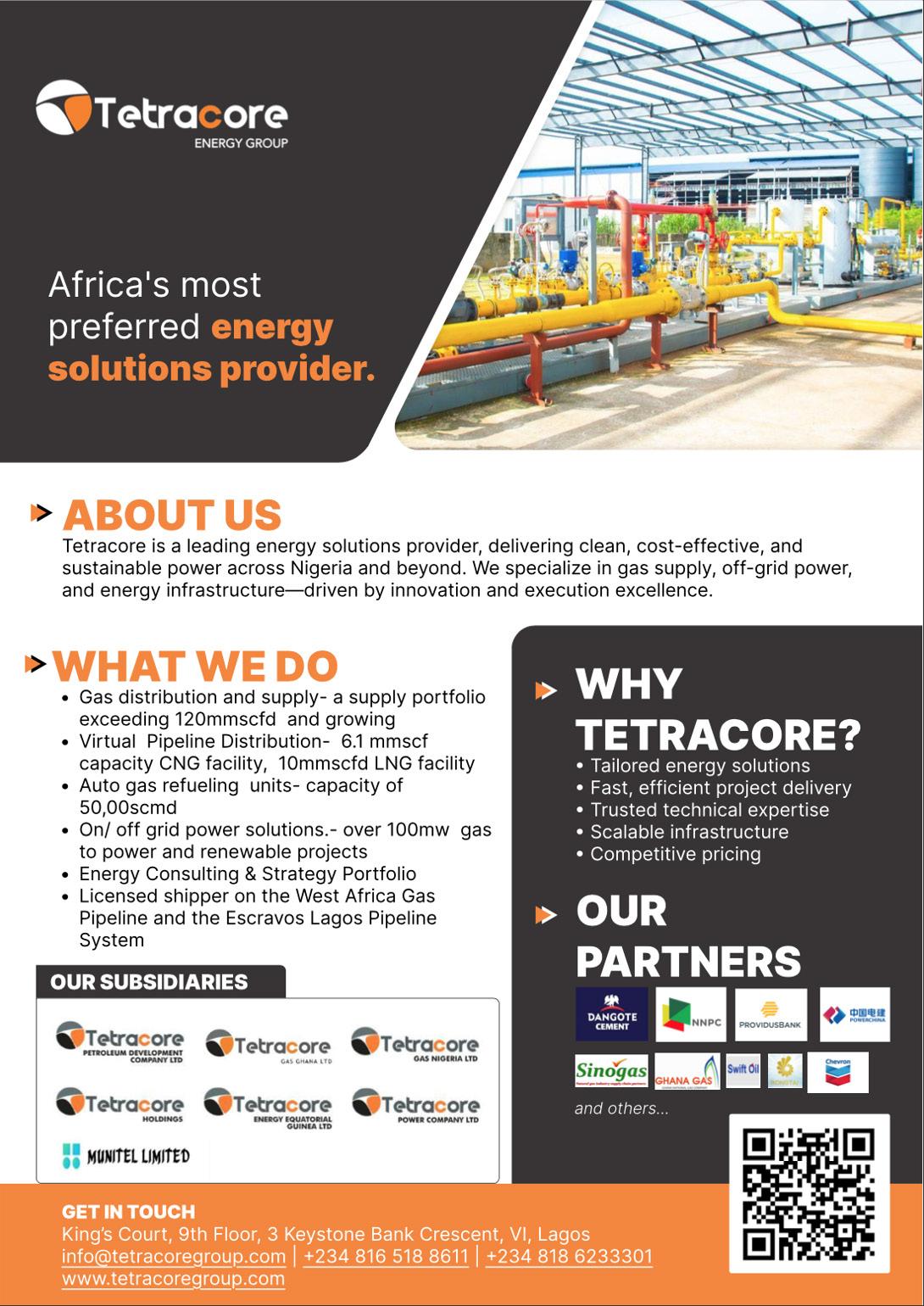
Policy Roundtable Report: Retail Infrastructure Safety –
Building Trust and Compliance
at the Last Mile

The 2025 Gas Safety Conference (GSC) featured a high-level Policy Roundtable focused on the theme “Retail Infrastructure Safety: Building Trust and Compliance at the Last Mile.” This session convened critical stakeholders from across the public and private sectors, with participation from the Major Energy Marketers Association of Nigeria (MEMAN), AYA Shafa Group, the Petroleum Technology Development Fund (PTDF – Gas Division), and Tetracore Energy Group. The panel featured contributions from Engr. Teryima Toryila, Ere Iyalla, Sir Engr. Gabriel Orukpe, and Adekoya Adeyemi James, and was moderated by Dr. Dimeji Belo, mni.
The session’s objective was clear: to address systemic safety challenges in Nigeria’s gas retail ecosystem—particularly LPG and CNG—and to explore how stronger regulatory alignment, industry collaboration, and consumer trust could accelerate the safe adoption of gas technologies. The conversation underscored that safety is no longer a box-ticking compliance exercise but a strategic requirement for attracting investment, ensuring operational continuity, and building public confidence.
Setting the tone for the discussion, Mr. Adekoya Adeyemi James of Tetracore Energy announced the company’s bold
plan to expand its CNG processing capacity from 6.1 million to 50 million standard cubic feet per day by the end of the year. This commitment demonstrates growing industry confidence in Nigeria’s domestic gas market, and the expansion is being executed with close regulatory collaboration and a strong emphasis on operator training, emergency preparedness, and compliance audits.
On the institutional side, Ere Iyalla of PTDF provided insight into the Fund’s dual-track strategy of capacity building and local technology development. PTDF is investing in Centres of Excellence in Port Harcourt and Kaduna focused on vocational and technical safety training. In addition, the Fund is advocating for the establishment of a National Gas Safety Innovation Fund to support Nigerian startups developing affordable safety technologies. These tools would help smaller operators access practical solutions such as leak detection systems, emergency alarms, and digital safety dashboards—ultimately improving lastmile risk management.
Representing MEMAN, Sir Engr. Gabriel Orukpe described how the association is fostering a unified safety culture across its 3,000+ retail outlets. MEMAN conducts joint safety inspections, collaborates with regulators such as the
NMDPRA, and shares public-facing sustainability reports. However, he highlighted the regulatory fragmentation that continues to plague the industry. Multiple agencies with overlapping mandates—such as NMDPRA, SON, NESREA, and NUPRC—have created a cumbersome compliance landscape that hinders prompt implementation and creates confusion among operators. Orukpe called for a unified regulatory framework to harmonize safety, environmental, and operational standards across the gas value chain.
Engr. Teryima Toryila of AYA Shafa offered practical insight into the realities faced by new entrants in the gas sector. Shafa, having only recently launched its first CNG retail station, is nonetheless committed to embedding safety into the core of its business operations. The company has implemented rigorous staff training programmes, developed robust operational procedures, and enforced vendor safety compliance. Toryila noted that leadership commitment and clear emergency response planning are essential for creating a culture of safety that extends across the organization and its partners.
Transport and contractor-related risks were also discussed at length. Tetracore shared its journey management approach, which includes the use of In-Vehicle Monitoring Systems (IVMS), driver competency assessments, and daily health checks for drivers handling CNG transportation. These initiatives were presented as best practices that should be replicated industry-wide. The panel further emphasized the importance of certified vendor management and proposed the institutionalization of platforms like eSPAN to vet, accredit, and monitor contractors working in high-risk areas of the gas value chain.
The role of public awareness emerged as a critical pillar for sustaining the gas transition. Speakers agreed that widespread misinformation about CNG safety continues to deter consumer adoption. PTDF and PCNGi jointly stressed the importance of a nationwide awareness campaign to educate the public on safe usage, incident response, and how to identify and report unsafe gas vendors. The session
Key Takeaways
Ê Safety is a prerequisite for trust, adoption, and investment in the gas value chain.
Ê Harmonizing safety, environmental, and operational regulations is essential for reducing compliance ambiguity.
Ê Building local capacity and developing indigenous safety technologies will be key to scalable, sustainable adoption.
also addressed a recent road traffic accident that had been misreported as a CNG-related explosion. Expert clarification from regulators and private sector leaders revealed that the CNG tanks involved in the incident remained intact— reaffirming the inherent safety of CNG infrastructure when built and maintained to specification.
First responders also featured prominently in the discussion. Representatives from the Federal Fire Service and the Nigeria Police Anti-Bomb Squad affirmed their readiness to manage gas-related incidents but called for improved sensitisation, insurance coverage, and legislative support for field personnel. They advocated for better coordination among emergency response agencies and the incorporation of fire and explosion scenarios in national safety training modules.
The session concluded with a forward-looking reflection. Panelists and participants alike expressed optimism about the potential for CNG and LPG to drive energy diversification, reduce emissions, and improve household energy access. However, they cautioned that these outcomes hinge on mainstreaming safety into all aspects of gas retail infrastructure—from regulation to roadside operations. Young professionals in the audience were encouraged to participate in the sector through mentorship and incubation opportunities, with several private companies offering to onboard prospective entrepreneurs and investors.
Conclusion
In conclusion, the Policy Roundtable reinforced that safety is not merely a technical protocol—it is the foundation upon which Nigeria’s gas transition must be built. Through clear policy reforms, institutional collaboration, local innovation, and public education, Nigeria can create a gas retail ecosystem that is not only cleaner but safer and more inclusive. The commitments made by MEMAN, PTDF, AYA Shafa, and Tetracore at this session offer a strong roadmap for government, industry, and civil society to jointly build a gas-powered future anchored in trust, efficiency, and operational excellence. �
Ê Transport safety and contractor compliance are priority risk areas that require industry-wide standards and enforcement tools.
Ê National consumer education campaigns are urgently needed to build grassroots confidence in CNG and LPG.
Ê First responder readiness must be enhanced through training, insurance, and legislative review.
Spotlight Sustaining the Drive:
Institutionalizing Safe Practices in CNG Autogas Adoption

The spotlight on Sustaining the Drive: Institutionalizing Safe Practices in CNG Autogas Adoption was delivered by Engr. Zayyanu Tembari Yabo on behalf of PCNGi’s Program Director, Engr. Michael Oluwagbemi. Engr. Tembari delivered a forward-looking message that combined policy vision with operational realities. His address offered insights into the growing national drive to replace petroleum-based transportation with cleaner, safer compressed natural gas (CNG) alternatives, while embedding safety and trust at the heart of the transition.
The keynote opened with a sobering analysis of Nigeria’s gas utilization profile. While over 7 billion standard cubic feet (scf) of gas are produced daily, more than 4 billion scf is either flared or reinjected, and only 1.2–1.3 billion scf is consumed domestically. Of this, a negligible 0.35% is used for CNG mobility, underscoring both the missed opportunity and the vast potential that lies ahead. The PCNGi’s strategic mandate to convert one million vehicles to CNG by 2027 offers a pathway to scale domestic CNG consumption from the current 40 million scf/day to over 200 million scf/ day—a fivefold increase. Over the long term, daily consumption could reach 1 billion scf, unlocking widespread cost savings, emissions reduction, and industrial linkages across Nigeria’s transportation and energy sectors.
Progress over the last 18 months has been significant. The PCNGi has supported the expansion of CNG retail outlets from seven to more than 100, increased the number of certified conversion centres from fewer than five to over 250, and trained more than 5,000 technicians. These efforts have catalyzed over $1 billion in private investment—without government subsidy—demonstrating growing market confidence in the CNG value chain. According to Engr. Tembari, the transformation is not just technical, but institutional and behavioural. It is about “creating a viable market where willing buyers and willing sellers can interact efficiently, without undue government intervention.”
Yet with growth comes the heightened responsibility to ensure public safety. Drawing on past incidents—such as the CNG safety scare in Benin—the keynote emphasized that safety is not an afterthought but a prerequisite for public trust and adoption. One major safety failure, Tembari warned, can set the industry back by years. Thus, institutionalizing safe practices is not only prudent but essential for sustaining the drive.
To this end, the PCNGi has adopted a multi-pronged safety framework. It is collaborating with regulatory agencies—including the NMDPRA, SON, NADDC, and Federal Road Safety Corps—to harmonize safety standards, develop consistent guidelines, and promote widespread compliance across the CNG ecosystem. It is also scaling targeted public awareness campaigns and deepening the training of technicians, drivers, fleet operators, and first responders.
In his concluding remarks, Engr. Tembari reframed the energy transition as not just a technical or regulatory effort, but a reaffirmation of national values. CNG autogas adoption is tied to broader goals of energy security, economic resilience, environmental responsibility, and institutional integrity. “Safety,” he declared, “is not only a destination but a shared responsibility. Let us not just power vehicles with gas—let us power progress with trust and confidence.” �
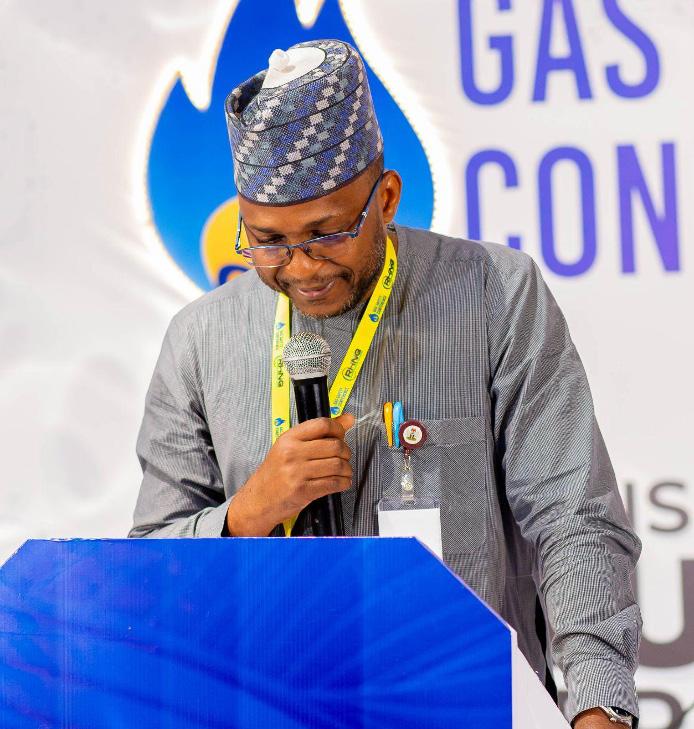
Key Takeaways
Ê Less than 0.35% of Nigeria’s domestic gas is currently used for CNG mobility, underscoring massive potential for scale.
Ê PCNGi has driven remarkable growth: 250+ conversion centres, 100+ retail outlets, 50,000+ vehicle conversions, and $1 billion in private investment.
Ê Safety remains the cornerstone of public confidence in CNG adoption. A single incident can significantly undermine market momentum.
Ê Institutionalizing safety through regulatory harmonization, workforce training, and public education is critical for sustaining long-term adoption.
Ê PCNGi is leading a whole-of-sector approach that positions CNG not only as a cleaner fuel alternative, but as a platform for national development.
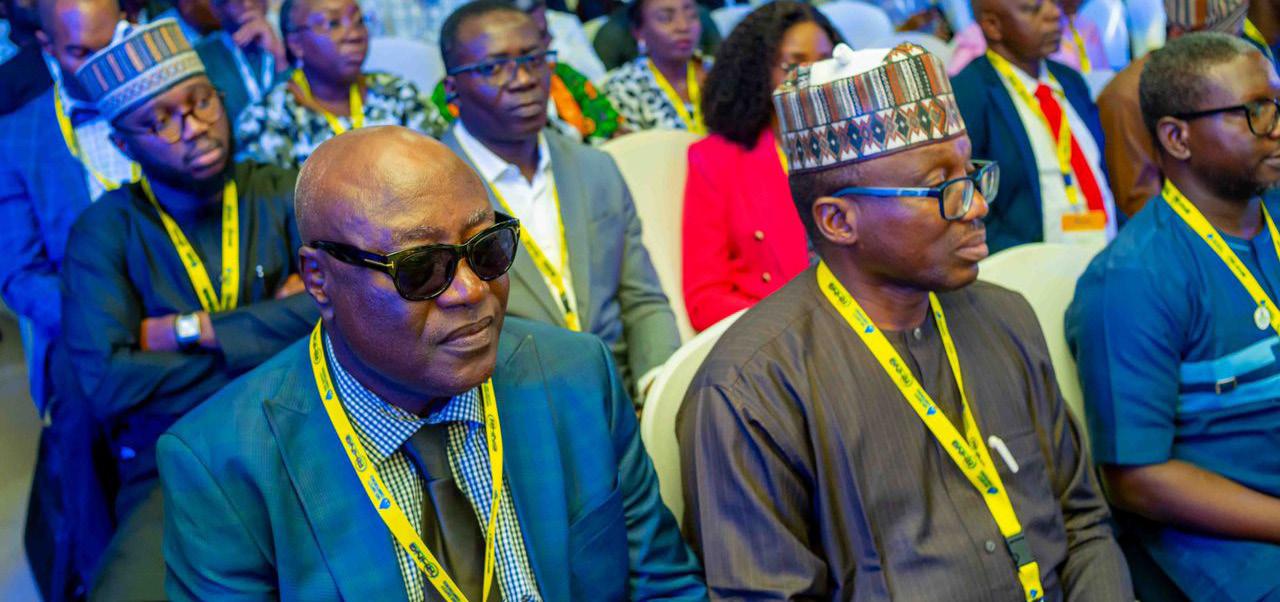

Panel Report:
Advancing Gas Conversion Standards for Vehicles and Engines in Nigeria
Moderator: Dr. Andrew John, Petroleum Training Institute (PTI), Warri
Panelists:
^ Engr. Zayanu Tambari, Regulatory & Compliance Directorate, Presidential CNG Initiative (PCNGi)
^ Engr. Seun Faluyi, Nigerian Society of Engineers (NSE)
^ Engr. Philip Ianna, National Automotive Design and Development Council (NADDC)
Under the stewardship of Dr. Andrew John, Plenary Session 2 of the Gas Safety Conference 2025 convened key actors in Nigeria’s gas-mobility ecosystem to evaluate the readiness, safety, and regulatory frameworks essential for scaling Compressed Natural Gas (CNG) conversions. Building on the National Transportation Policy’s pillars of economic inclusion, environmental sustainability, and infrastructural development, the dialogue aimed to ensure that Nigeria’s pivot to gas-powered engines proceeds with technical rigor and institutional coherence.PCNGi’s Strategic Enabling Role
Since its inception in October 2023, PCNGi has functioned as a catalytic coordinator—aligning Standards Organisation of Nigeria (SON), NMDPRA, NADDC, and FRSC under a unified Regulatory and Compliance Directorate. Engr. Tambari clarified that rather than operating CNG stations directly, PCNGi sets and harmonizes inspection protocols, certifies conversion kits, and enforces installation standards.
Addressing public concerns over station queues, he reframed high utilization as an indicator of robust market demand. He urged real-estate and financial investors to capitalize on this “demand signal” by expanding CNG station infrastructure, thus converting transient capacity shortages into sustainable investment opportunities.
Embedding Safety Across the Conversion Lifecycle
Engr. Faluyi emphasized that the accelerated pace of CNG adoption must never compromise safety. He described the Nigerian Institution of Safety Engineers’ monthly “lessons learned” workshops—where practitioners dissect global near-misses and failures to refine best practices. Faluyi rec-
ommended formal integration of certified safety engineers into every phase of the CNG value chain:
^ Design & Component Certification: Verifying materials, regulators, and tank integrity.
^ Installation & Commissioning: Enforcing welding standards, pressure-testing, and leak detection.
^ Operation & Maintenance: Mandating scheduled inspections, sensor recalibration, and emergencyresponse drills.
^ Decommissioning: Defining end-of-life protocols for cylinder disposal and system purging.
Workforce Development via National Occupational Standards
Engr. Ianna detailed NADDC’s pioneering work drafting National Occupational Standards (NOS) for CNG conversion, approved by NBTE in 2022. These NOS outline a tiered competency framework—Levels 1 through 4—spanning basic assembly to expert system integration. With 24 zonal centers outfitted for mechatronics and gas handling, NADDC has trained hundreds of technicians, including targeted programs to increase female participation. This standardized curriculum and certification regime ensures that every technician and trainer nationwide operates to the same exacting benchmark.
Strengthening Inter-Agency Synergy
Panelists underscored that overlapping mandates among PCNGi, NADDC, SON, and NMDPRA risk procedural friction. To address this, working groups have been established that:
1. Draft jointly agreed technical standards.
2. Share a unified digital registry of certified converters.
3. Conduct quarterly inter-agency audits to eliminate redundant inspections.
Formalizing these arrangements through MoUs and a permanent Gas Conversion Task Force will safeguard policy coherence as standards evolve.
fuel strategies can thrive when underpinned by reliable supply and investor confidence.
Restoring Public Confidence Through Transparent Communication
In light of recent misreported safety incidents, panelists agreed that PCNGi must implement a rapid-response communication protocol: release verified facts within 24 hours of any gas-related event, followed by community-level outreach to dispel misinformation and reinforce the proven safety record of modern CNG systems.
International Comparisons and Local Context
While some mature markets are scaling back CNG, panelists noted that these shifts reflect ageing infrastructure and liberalized energy portfolios. Nigeria, by contrast, remains in the early adoption phase with abundant domestic gas. Successful models—such as South Korea’s CNG buses and LPG taxis—demonstrate how context-specific
Infrastructure and Logistics Considerations
Recognizing the risk inherent in road-based “virtual pipelines,” panelists advocated for accelerated pipeline expansion and strict enforcement of right-of-way clearances. They stressed that training programs must extend beyond conversion technicians to encompass drivers, station attendants, and logistics operators—ensuring that every link in the distribution chain adheres to standardized safety and handling procedures.
Dr. Andrew John closed by affirming that Nigeria stands at a pivotal juncture in its gas-mobility transition. The session made clear that the challenge transcends engineering: it demands policy foresight, institutional collaboration, human-capital development, infrastructural investment, and strategic communication. The panel’s insights present a comprehensive roadmap to scale CNG conversion responsibly, safely, and sustainably. �
Actionable Takeaways
Ê Institutionalise Safety Oversight: Embed NSE-certified safety engineers in all CNG conversion and inspection processes.
Ê Mandate Certification: Require NADDC/NBTE-approved qualifications for all conversion technicians and gas-transport operators.
Ê Mobilize Private Capital: Offer targeted fiscal incentives—tax holidays, concessional loans—to attract investment in CNG stations and pipelines.
Ê Standardize Incident Communication: Establish a PCNGi-led protocol for prompt, accurate public updates following any safety incident.
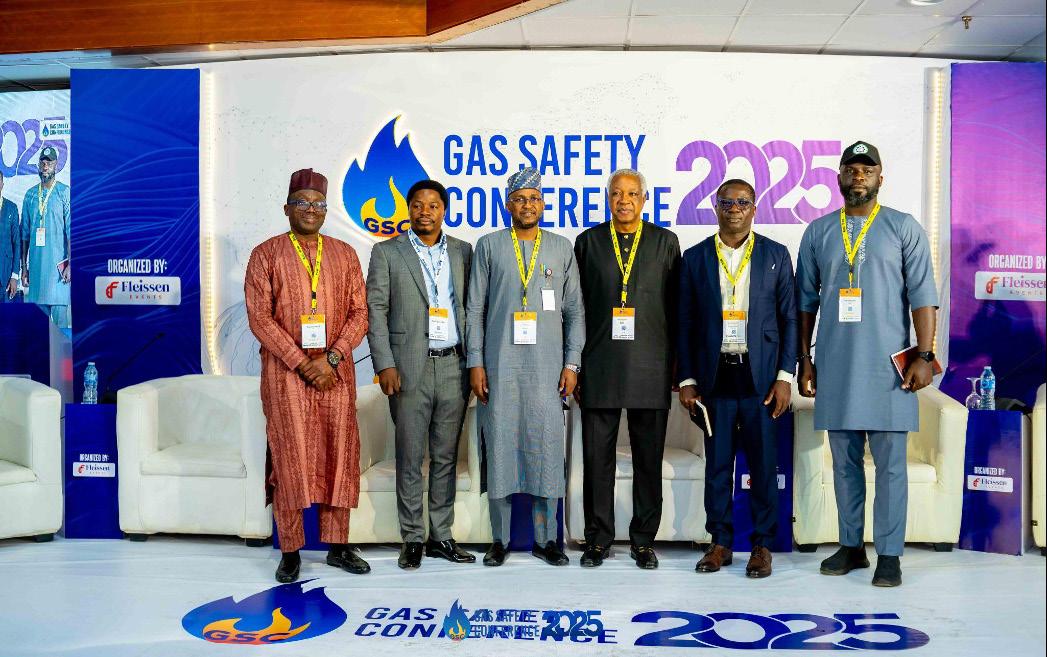
Ê Consolidate Regulatory Functions: Form a permanent Gas Conversion Task Force to harmonize roles and eliminate overlap across PCNGi, NADDC, SON, and NMDPRA.
Ê Protect Pipeline Corridors: Enforce right-of-way regulations in collaboration with urban-planning and security agencies.
Ê Promote Inclusive Training: Expand gender-inclusive and region-targeted CNG conversion programs to build a diverse technical workforce.
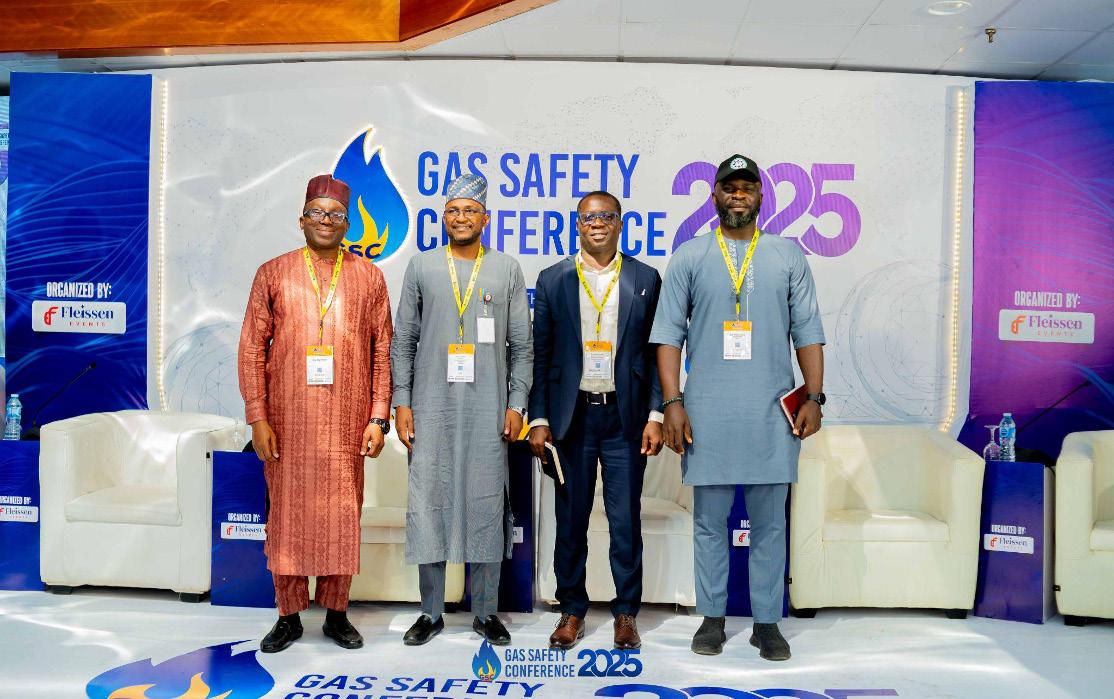
Panel Report:
Built Environment Safety in Gas Usage: Gas Reticulation, Legal & Insurance Risk Manage ment in Gas Deployment
Moderator: Ngozi Princess Dimkpa, Founder, PN& C Legal Practice and Consultancy Services

Panelists:
^ Bldr. Adetunji Adeniran, mni Council of Registered Builders of Nigeria (CORBON)
^ Engr. Seun Faluyi (Nigerian Society of Engineers, NSE)
^ Mr. Ajuyah Omeresan Alfred (National Insurance Commission, NAICOM)
^ Bldr. John Bawa Zaki Nigerian Institute of Building (NIOB)
^ Dr. Sherif Razak (Federal Capital Development Authority, FCDA)
^ Dr. Zayyanu Mohammed (Federal Capital Development Authority, FCDA)
Bldr. Peter Omale (Nigerian Institute of Building, NIOB)
The panel session on “Built Environment Safety in Gas Usage – Gas Reticulation, Legal & Insurance Risk Management in Gas Deployment” was a critical component of the Gas Safety Conference 2025. Moderated by Ngozi Princess Dimkpa, a renowned legal and energy policy expert from PN & C Legal, the session underscored the essential nature of integrating rigorous safety standards, robust legal frameworks, and comprehensive insurance policies into Nigeria’s expanding gas reticulation infrastructure.
Urban Planning and Gas
Reticulation
Dr. Sherif Razak from FCDA initiated discussions by highlighting Abuja’s urban planning strategies that integrate
gas reticulation within building design approvals. He detailed the emerging prevalence of centralized gas piping in high-end residential and commercial developments.
Dr. Razak emphasized that while Abuja’s master plan now designates specific zones for gas infrastructure, widespread adoption requires enhanced regulatory encouragement and standardized safety protocols.
Engineering Codes and Competency
Engr. Seun Faluyi, representing the NSE, provided an engineering perspective, stressing the critical importance of adherence to international safety codes, such as NFPA 58, in gas installations. He confirmed ongoing revisions to Nigeria’s National Building Code, emphasizing the introduction of detailed guidelines on materials, leak prevention, ventilation, and emergency protocols. Faluyi asserted that installations must only be performed by engineers certified by the Council for the Regulation of Engineering in Nigeria (COREN), underlining that safety responsibility remains firmly with certified engineers, developers, and licensed contractors.
Professional Oversight and Accountability
Bldr. John Bawa Zaki from CORBON delineated the distinct roles between professional associations and regulatory bodies, stressing CORBON’s mandate to enforce builder registration, certification, and professional development. He outlined disciplinary measures for non-compliance, including the Engineering Tribunal’s authority to impose sanctions. Complementing Zaki’s insights, Bldr. Peter Omale of NIOB advocated clearer demarcation of responsibilities between practitioners and regulators, reinforcing the imperative for builders to continually update their safety knowledge in line with current gas infrastructure developments.
Insurance and Financial Risk Management
Mr. Ajuyah Omeresan Alfred of NAICOM addressed the crucial role insurance plays in mitigating risks associated with gas deployment. He identified gas installations as special risks, requiring tailored insurance products, such as Contractors All-Risk Insurance, Public Liability Insurance, and Operational Risk Insurance. Alfred detailed that insurance companies meticulously evaluate installation projects based on installer qualifications, compliance with safety standards, and proximity to ignition risks. He also indicated that premiums for compressed natural gas (CNG) vehicles might undergo future adjustments to reflect their unique risks.
to proactively inform consumers and maintain updated public registries of certified professionals.
Planning, Zoning, and Facility Siting
Dr. Zayyanu Mohammed from FCDA reinforced the necessity of strictly adhering to zoning regulations for gas infrastructure. He reassured the audience that designated zoning corridors and safety buffers are rigorously enforced in Abuja’s urban areas, attributing unauthorized installations to unregulated development, particularly in peri-urban zones. Dr. Mohammed advocated greater public transparency regarding zoning policies and improved technical support mechanisms during construction phases.
Legal Implications and Consumer Protection
Moderator Dimkpa raised important legal questions regarding accountability for unsafe gas installations. Engr. Faluyi clarified that COREN, rather than NSE, holds disciplinary jurisdiction over negligent engineers. He noted that individuals affected by negligence have legal recourse against responsible engineers and developers. Dimkpa highlighted a significant gap in public awareness concerning available legal protections, urging regulators
Audience Interaction and Recommendations
Audience contributions emphasized the need for robust public communication strategies, enhanced transparency in zoning regulations, and increased technical involvement in national building code discussions. Panelists agreed that while gas installations could lead to localized damage, building collapses typically result from structural failures, reaffirming the necessity of strict adherence to engineering and building codes. �
Actionable Recommendations
Ê Accelerate the finalization and dissemination of the revised National Building Code, including comprehensive sections dedicated to gas reticulation.
Ê Institutionalize multi-agency review processes involving FCDA, NMDPRA, NSE, SON, and NAICOM for building plans incorporating gas systems.
Ê Clearly designate zoning corridors and enforce safety buffers for gas infrastructure, particularly in new and redeveloping residential communities.
Ê Enforce mandatory registration and certification of gas installation professionals with COREN and CORBON, introducing stringent penalties for non-compliance.
Ê Implement routine inspections of installed gas reticulation systems as a standard aspect of development control.
Ê Ensure gas infrastructure design and installation are exclusively undertaken by certified professionals, maintaining accountability throughout project life cycles.
Ê Include comprehensive risk assessments for gas systems during initial project planning to qualify for insurance and building approval.
Ê Conduct regular internal and third-party safety audits for centralized gas reticulation systems within estates.
Ê Develop specialized insurance products tailored to residential and commercial gas installations, incentivizing compliance through risk-based premium pricing.
Ê Launch extensive public education campaigns on gas safety, providing clear and accessible information regarding certified professionals and legal protections available.
The panel effectively underscored the imperative for rigorous safety standards, coherent regulatory frameworks, and comprehensive insurance products to accompany Nigeria’s growing adoption of gas reticulation in urban environments. The recommendations provided a clear roadmap to fortify consumer trust and enhance safety in the built environment, positioning gas as a sustainable and secure energy source for the future.
Retail Infrastructure and End-User Safety: Strengthening
Trust in LPG and Autogas Expansion
Moderator: Magose Abraham Eju
Panelists:
^ Salahuddeen Tahir – Nigerian National Petroleum Company (NNPC)
^ Sir Engr. Gabriel Orukpe – General Manager, QHSE, Ardova PLC
^ Engr. Oyibo Ogale – Head, HSE, Matrix Energy
^ Teryima Toryila – Representative of Olufemi A. Adewole, Executive Secretary, DAPPMAN
The panel on “Retail Infrastructure and End-User Safety: Strengthening Trust in LPG and Autogas Expansion” addressed critical issues related to the rapid growth of LPG and autogas use in Nigeria, emphasizing the need to align safety infrastructure, regulatory compliance, and consumer education with the pace of adoption. Moderator Magose Abraham Eju underscored that while Nigeria has made commendable progress in expanding LPG and autogas availability, safety protocols and public awareness are currently lagging behind.
Sector Overview and Strategic Context
Salahuddeen Tahir of NNPC provided an extensive overview of Nigeria’s gas sector, highlighting the nation’s shift from oil-dependency towards leveraging its significant gas reserves of over 210 TCF. Tahir outlined notable milestones including the Nigerian LNG’s (NLNG) expansion from two to six operational trains, with a seventh train under construction, and the substantial reduction in gas flaring from over 70% to approximately 7%. He emphasized that around 40% of national gas output is channeled to NLNG, while 16% is directed towards power generation. Tahir commended the ambitious targets set by the government’s “Decade of Gas” initiative, aiming for an LPG consumption of 5 million metric tonnes per annum by 2030. However, he stressed that retail infrastructure and regulatory frameworks must be significantly enhanced to safely manage LPG and CNG proliferation across the nation, advocating strongly for extensive public awareness campaigns to mitigate gas-related hazards.
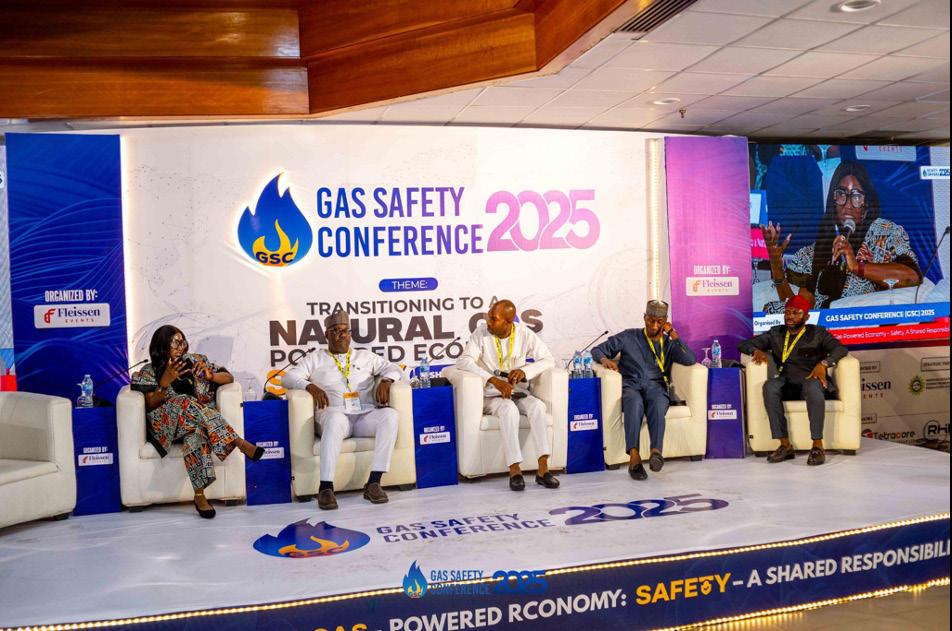
Depot and Industry Coordination
Representing Olufemi A. Adewole, Executive Secretary of DAPPMAN, Teryima Toryila discussed the critical role played by depot operators in ensuring end-user safety. He explained that DAPPMAN members rigorously comply with the safety regulations set forth by NMDPRA and global standards, underscoring that depot-level compliance significantly influences downstream safety. Toryila detailed collaborative safety campaigns with organizations such as NLPGA, NLCMA, and women’s advocacy groups, highlighting the collective industry effort to raise public awareness about LPG and autogas safety. Nonetheless, he acknowledged the persistent gaps in public education and regulatory enforcement and called for increased training, consistent audit procedures, and stronger regulatory oversight.
Building a Culture of Safety in Retail Outlets
Sir Engr. Gabriel Orukpe from Ardova PLC shared insights into Ardova’s strategic approach to embedding safety culture within retail outlets, particularly addressing challenges such as high employee turnover and narrow profit margins. Orukpe detailed Ardova’s practice of integrating quarterly audits into routine training programs, complemented by daily “toolbox” meetings at every retail station. These meetings, facilitated by designated safety marshals, focus on practical hazard identification and response strategies. Highlighting occupational health concerns, he advocated for regular benzene exposure monitoring and emphasized the necessity of health screenings for workers regularly handling hydrocarbons.
Real-World Incident: Matrix Energy’s Community Engagement
Engr. Oyibo Ogale of Matrix Energy provided a candid account of a significant LPG fire incident that took place at one of Matrix Energy’s facilities in 2022. Ogale described the incident as a catalyst for substantial improvements in community safety awareness and emergency preparedness. Before the incident, community participation in emergency drills was minimal, largely motivated by financial incentives. Following the event, Matrix Energy introduced mandatory quarterly emergency drills involving the Fire Service, NMDPRA, FRSC, and community representatives. Ogale highlighted the importance of transparency, open communication, and accountability in fostering community trust. She also recommended adopting advanced technologies such as QR codes for LPG cylinder traceability to ensure adherence to safety standards.
Addressing Technical and Regulatory Gaps
^ The panel acknowledged critical gaps between existing safety standards and their practical enforcement. Specific concerns highlighted by panelists included:
^ Insufficient independent cylinder and hose integrity testing infrastructure.
^ Poor enforcement of NIS 223 standards regarding cylinder lifespan and hose specifications.
^ Rising usage of higher propane blends without adequate assessment of equipment compatibility.
Key Recommendations
The panel provided the following actionable recommendations:
Ê Mandatory Training: Regular safety training and refresher courses for all depot operators, retail staff, and LPG transport personnel.
Ê Integrity Testing Infrastructure: Expanding certified cylinder and hose testing facilities and enforcing mandatory 5-year cylinder recertification.
^ Weak regulation of informal roadside LPG refillers.
^ Regulatory bodies perceived as revenue-centric rather than safety-focused.
Panelists recommended shifting regulatory emphasis from revenue generation to risk management, advocating for public safety rating certificates for compliant operators, enhanced training mandates, and standardized audit protocols.
Leveraging Technology for Safety and Efficiency
The panelists strongly endorsed technological innovation as a solution to reduce operational costs and bolster safety. Recommendations included:
^ Implementing digital automation of dispensing processes to minimize human errors.
^ Adopting energy-efficient microgrids at retail stations to reduce reliance on diesel-powered generators.
^ Utilizing smart inventory and asset management systems for proactive leak detection and equipment maintenance.
^ Introducing color coding and clear vehicle identification systems for LPG and CNG transport vehicles to improve emergency response effectiveness.
Ê Localized Public Awareness Campaigns: Conducting comprehensive public safety campaigns in multiple local languages through accessible media platforms.
Ê Risk-Focused Regulatory Oversight: Transitioning to risk-based regulatory audits emphasizing proactive risk mitigation over revenue-focused inspections.
Ê Incentivized Technological Adoption: Encouraging investments in automation, smart technologies, and renewable energy systems to enhance overall industry safety and cost-efficiency.
In conclusion, the panel underscored that ensuring robust safety infrastructure and fostering public confidence are critical to the sustainable expansion of Nigeria’s LPG and autogas sector. Concerted efforts by industry stakeholders, regulatory bodies, and communities are essential to maintain pace with sector growth, prioritizing comprehensive safety measures, continuous public education, and embracing technological advancements. Ultimately, the goal is not merely to expand gas availability, but to secure public trust through reliable and safe gas utilization.
Emergency Preparedness
and National Response: Gas Explosions and Road Accidents
Involving Bulk Gas Distribution Vehicles –Real-World Experiences
Moderator: Olabode Sowunmi, CEO, Cabtree
Panelists:
^ Sarki Abdulraham – Head of Plant Examinations, Federal Fire Service
^ Air Commodore A.K. Oyong – Director of Search & Rescue, National Emergency Management Agency (NEMA)
^ Deputy Corps Commander Aderonke Bamidele –Director, Corps Communications, Federal Road Safety Corps (FRSC)
^ CSP Emmanuel Nwagwu – Commander, Anti-Bomb Squad, Nigerian Police Force
The session on “Emergency Preparedness and National Response” brought together Nigeria’s foremost emergency-response agencies to examine the challenges and best practices in handling gas-related incidents. Moderator Olabode Sowunmi framed the discussion around two core scenarios: gas explosions and road accidents involving bulk gas distribution vehicles. Emphasis was placed on inter-agency coordination, communication protocols, incident command structures, and community engagement as critical enablers of effective response.
Chain of Command and LeadAgency Roles
Air Cdre A.K. Oyong (NEMA) opened by outlining NEMA’s statutory mandate to coordinate multi-agency responses. He provided the national emergency hotline numbers (0800-222-556362 and 020-99043760) and described how NEMA maintains a 24/7 call center that triages incoming reports, dispatches the appropriate first responders—fire service for thermal incidents, Anti-Bomb Squad for unexploded devices, FRSC for traffic management—and follows up to ensure incident closure.
DCC Aderonke Bamidele (FRSC) explained FRSC’s role in securing road corridors in case of any bulk-gas accidents. Upon receiving a call to 122, FRSC patrol teams are deployed to establish traffic cordons, facilitate safe flow of

emergency vehicles, and support casualty evacuation. She highlighted the recently launched FRSC mobile app, which allows citizens to report incidents, request roadside assistance, and access real-time traffic alerts.
Technical Response and Hazard Management
Sarki Abdulraham (Federal Fire Service) detailed the Federal Fire Service’s Incident Command System (ICS) for gas emergencies. He described graded response levels—from localized leak control using specialized foam or inert gas to full structural fire suppression—and the use of gas-specific detection equipment, breathing apparatus, and remote-control shut-off valves. Abdulraham stressed that “the best fire is the one that never happens,” advocating rigorous prevention through proper installation, maintenance, and leak testing.
CSP Emmanuel Nwagwu (Anti-Bomb Squad) addressed scenarios involving suspected secondary devices at explosion sites. He outlined bomb-scene protocols: establishing exclusion zones, deploying EOD robots for remote investigation, and coordinating with Civil Defense or military engineer units when structural instability is detected. Nwagwu underscored that swift risk assessment and controlled detonation can prevent further casualties.
Communication and Public Awareness
All panelists agreed that seamless communication—both inter-agency and with the public—is indispensable:
^ Unified Emergency Number: While multiple hotlines exist, Oyong and Abdulraham both called for harmonization under a single, well-publicized national emergency number to reduce confusion.
^ Training and Call-Center Rigor: Oyong noted that NEMA’s call-handlers receive psychological training to manage high-stress or unconventional calls and that every call is recorded and audited for quality assurance.
Actionable Recommendations
Ê Single National Emergency Number: Consolidate existing hotlines into one three-digit number, backed by a public-awareness campaign.
Ê Regular Multi-Agency Drills: Institutionalize quarterly full-scale exercises simulating gas leaks, explosions, and bulk-gas vehicle rollovers.
Ê Unified Incident Command Protocol: Adopt a standardized ICS template across NEMA, Fire Service, FRSC, and Police EOD units.
Ê Technology Integration: Expand the FRSC mobile app to include gas-incident reporting and integrate real-time incident data into NEMA’s dashboard.
^ Community Engagement: Bamidele and Abdulraham emphasised regular public drills, school-based education programs, and collaborations with community leaders to build grassroots awareness of emergency procedures.
Inter-Agency Collaboration and Lessons Learned
The Karu CNG-trailer explosion and subsequent fire in 2022 served as a case study. Oyong recounted how NEMA’s dashboard alerted all agencies within 500 m of the site; FRSC cleared the highway; Fire Service crews contained the blaze; and the Anti-Bomb Squad secured the perimeter against fuel-tank breaches. The swift, coordinated response underscored the value of joint exercises and shared standard operating procedures (SOPs).
Ê Specialized Training: Mandate joint training modules on gas hazard recognition, EOD procedures, and traffic management for all first-responder cadres.
Ê Community Outreach: Launch a nationwide “Know Your Number” campaign, with emphasis on schools, motor-parks, and residential estates in high-risk corridors.
Ê After-Action Reviews (AARs): Require post-incident AARs within 72 hours, shared among all agencies to capture lessons and update SOPs.
Ê Equipment Standardization: Ensure all response units maintain calibrated gas detectors, remote-control shutoff tools, and interoperable communication radios.
This panel underscored that effective emergency preparedness for gas explosions and bulk-gas vehicle accidents hinges on rigorous inter-agency coordination, robust communication systems, and community engagement. By implementing the above recommendations, Nigeria can significantly enhance its capacity to save lives, protect property, and maintain public confidence as its gas market continues to grow.
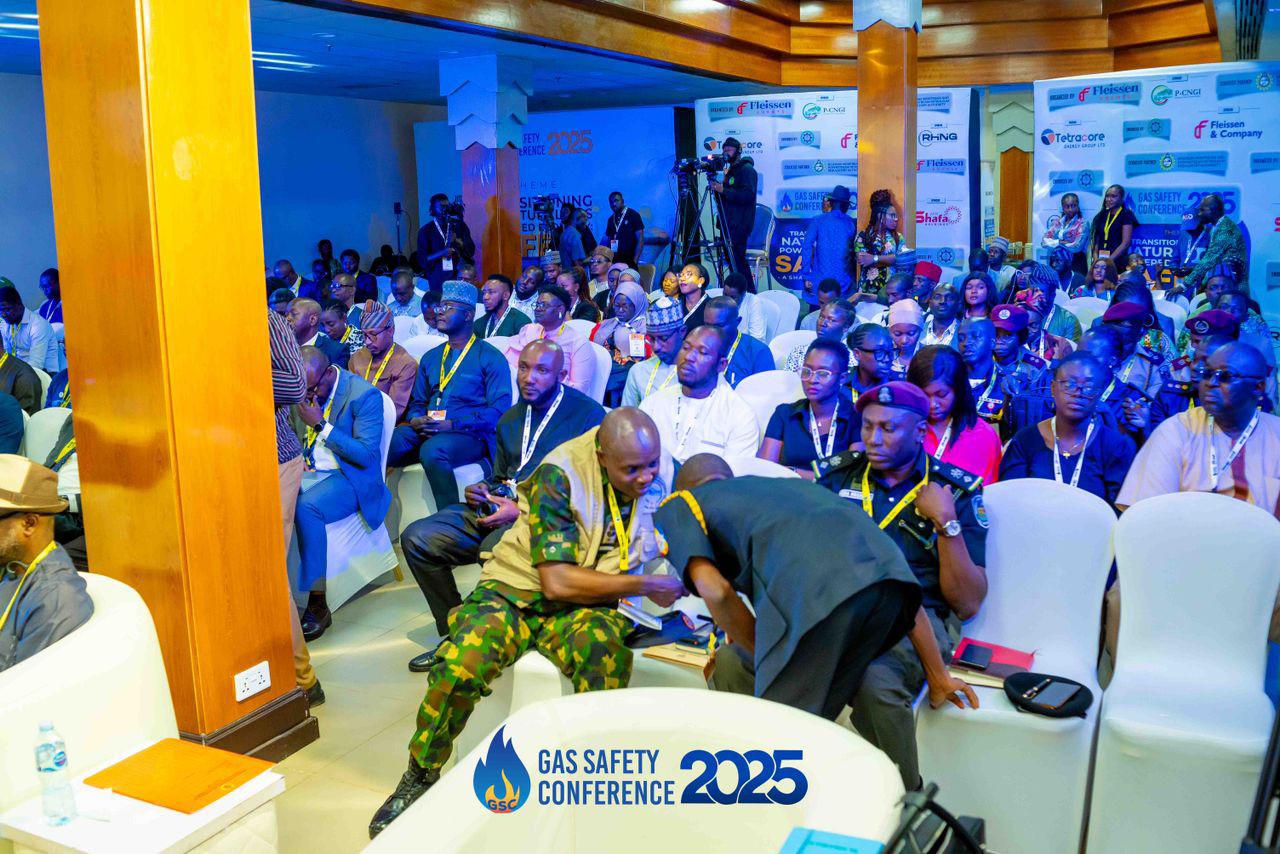

Closing Remarks
Delivered by Dr. Sunday Kanshio, Convener – Gas Safety Conference (GSC) 2025
In his closing address, Dr. Sunday Kanshio expressed pro found appreciation to all participants, speakers, mod erators, sponsors, and supporting institutions whose contributions made the inaugural Gas Safety Conference 2025 a success.
He acknowledged the intense and insightful discussions held over the two-day period, emphasizing that gas safety is not merely a technical or regulatory issue but a matter of protecting lives, communities, and national development. He noted that the conference successfully brought together stakeholders from across the gas value chain—regulators, producers, distributors, emergency services, legal experts, insurers, civil society, and the media—unified by a shared commitment to making gas use in Nigeria safer and more sustainable.
A key highlight, he remarked, was the adoption of the Na tional Gas Safety Declaration, signed by 26 stakeholders. Dr. Kanshio described the declaration as a landmark achieve ment, calling it not just a symbolic gesture but a living document that would serve as a reminder of the collective responsibility to uphold safety across the gas industry.

He reiterated that while gas—whether CNG, LPG, or LNG—is safe when properly handled, it requires specific protocols distinct from those used in the handling of other fuels such as liquid hydrocarbons. He stressed the need for continuous improvement in standards, compliance, and public awareness.
Looking ahead, Dr. Kanshio announced that preparations for the next edition of the Gas Safety Conference were already underway, with GSC 2026 expected to be bigger in scope and scale. He also noted that interim activities—such
as technical workshops and stakeholder dialogues—would be held to address urgent thematic gaps before the next conference.
In concluding, Dr. Kanshio called on all delegates to act as ambassadors of gas safety within their respective institutions. He reminded them that safety is not the responsibility of a single department but a culture that must be embraced across all levels of operation. He thanked everyone for their time and dedication, and wished all attendees safe travels. �
